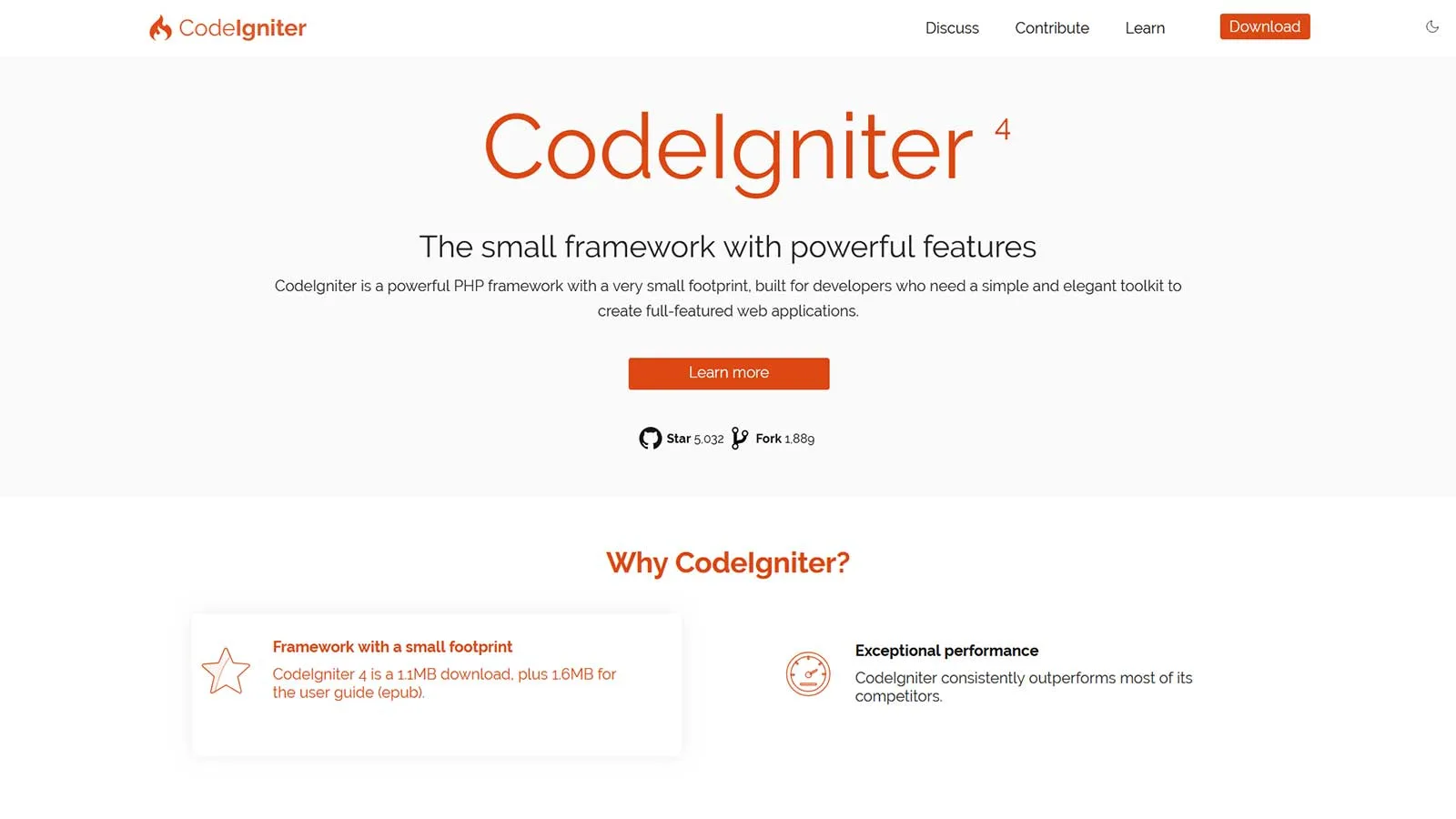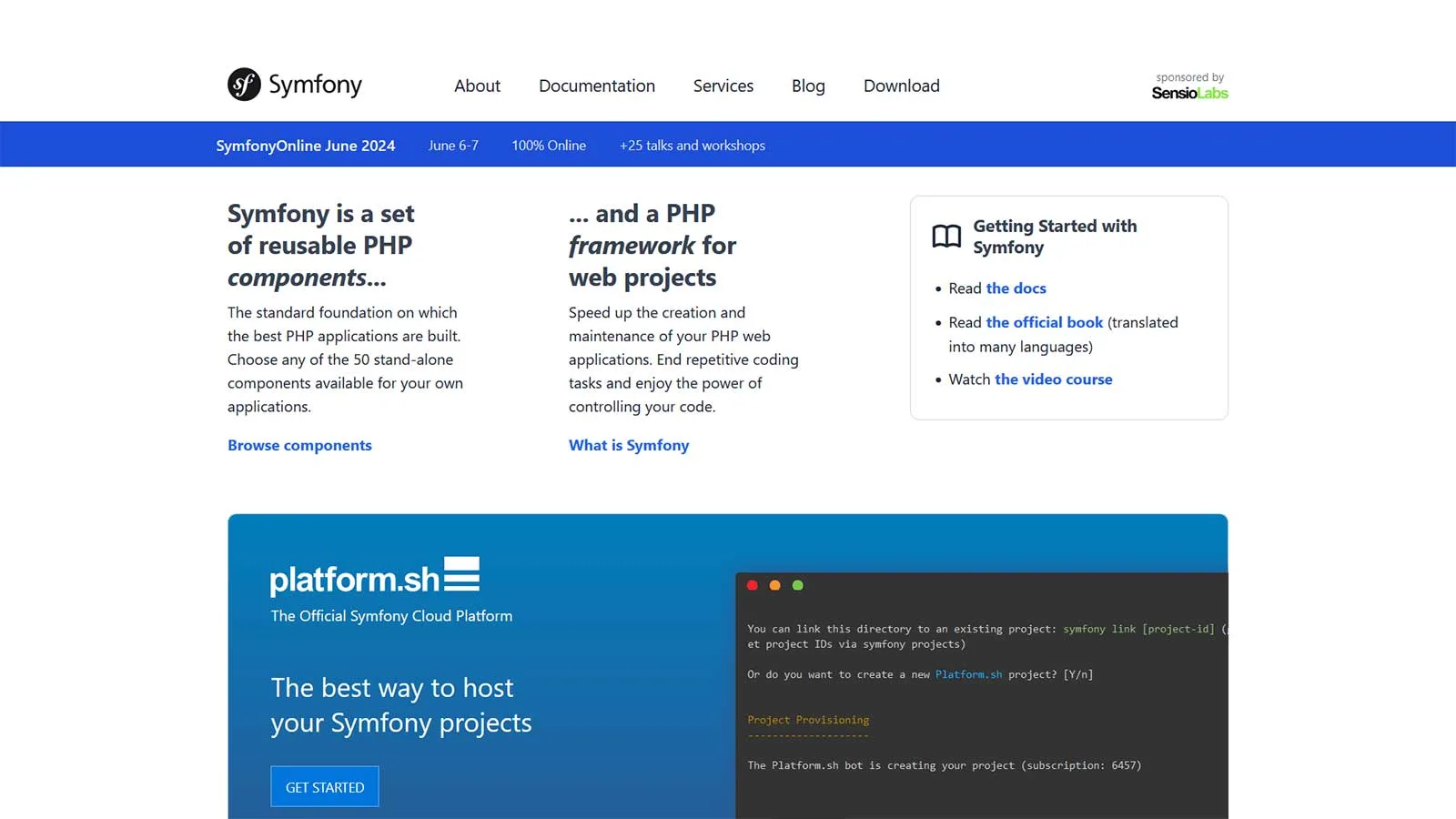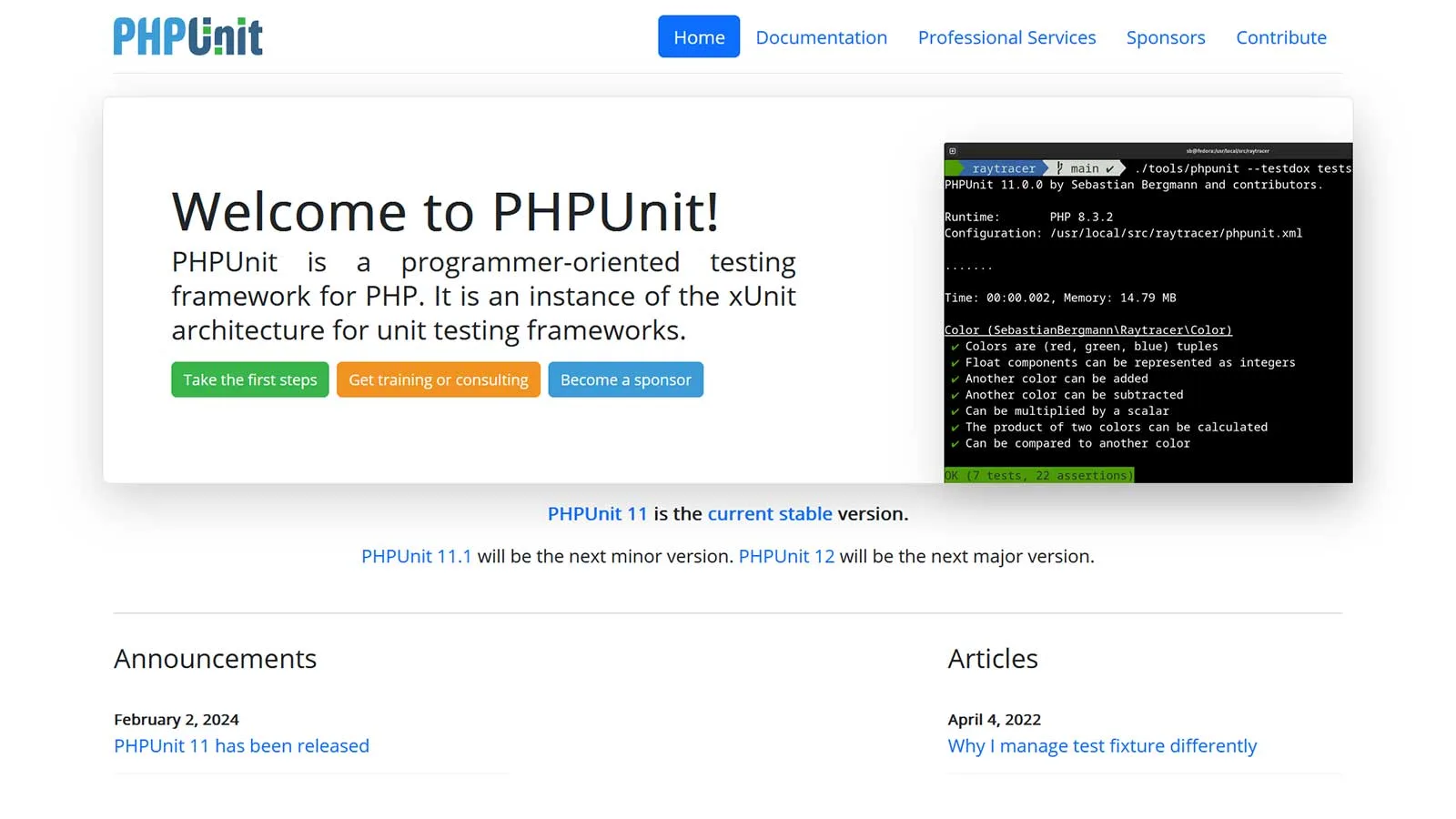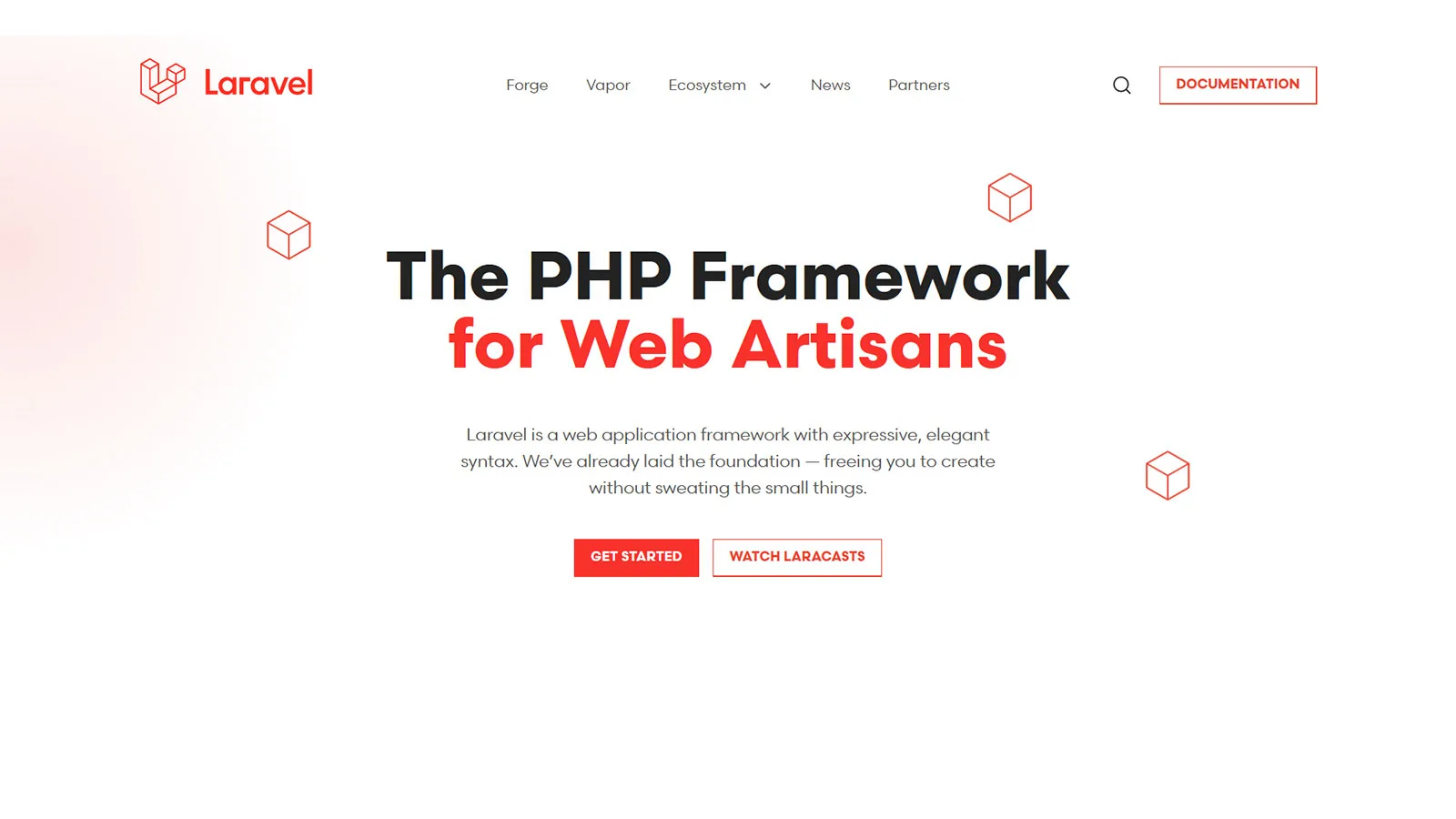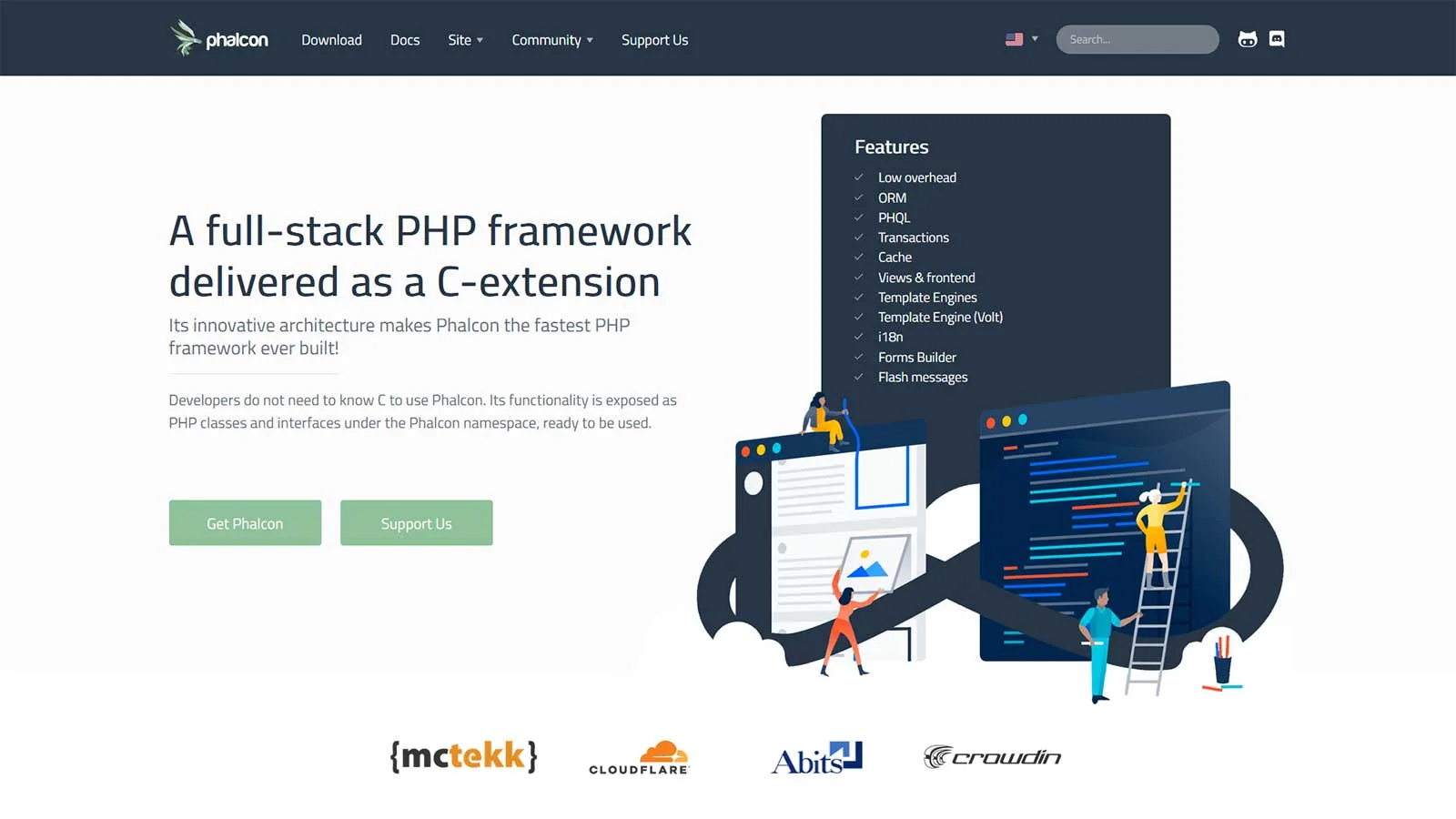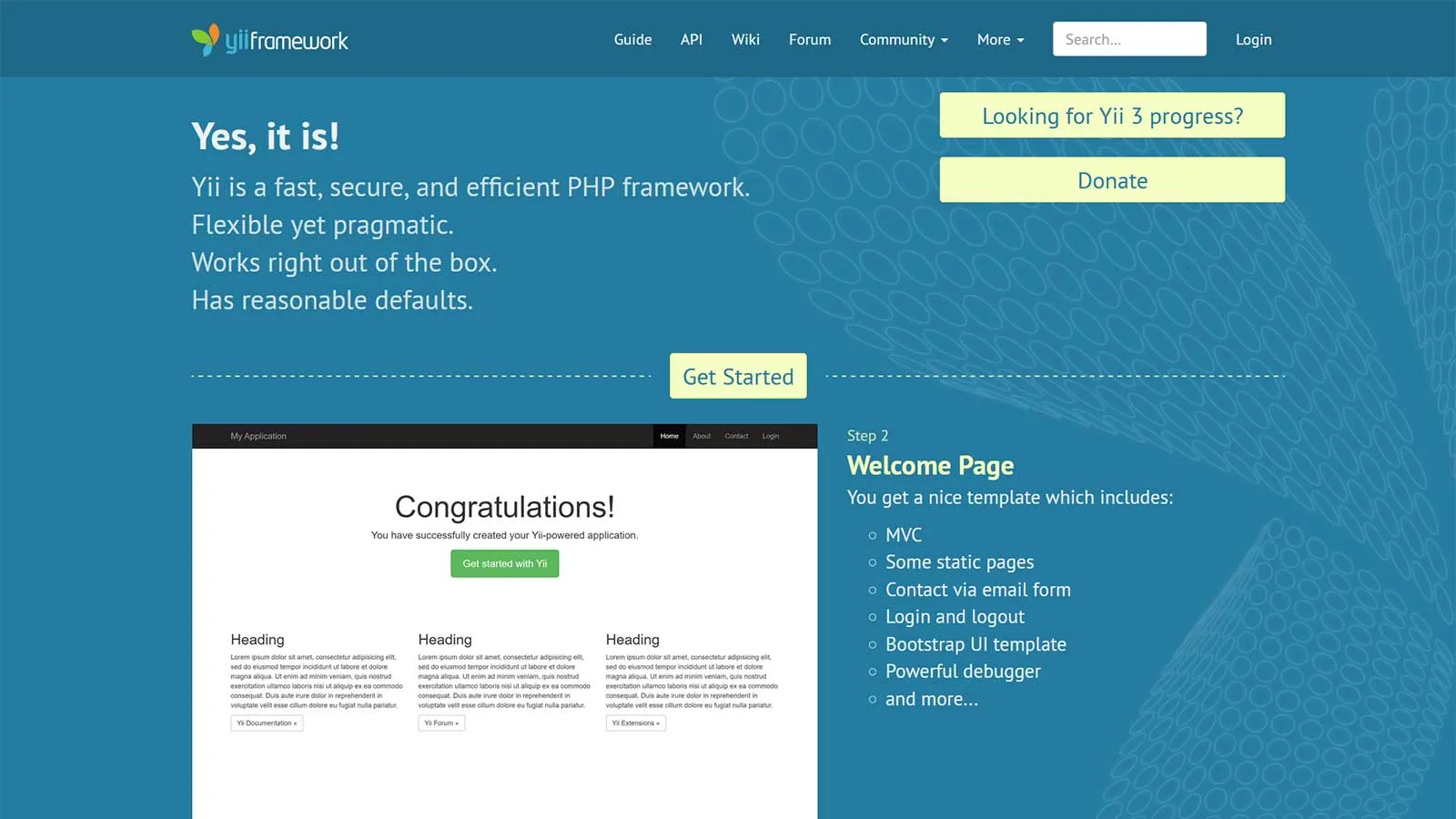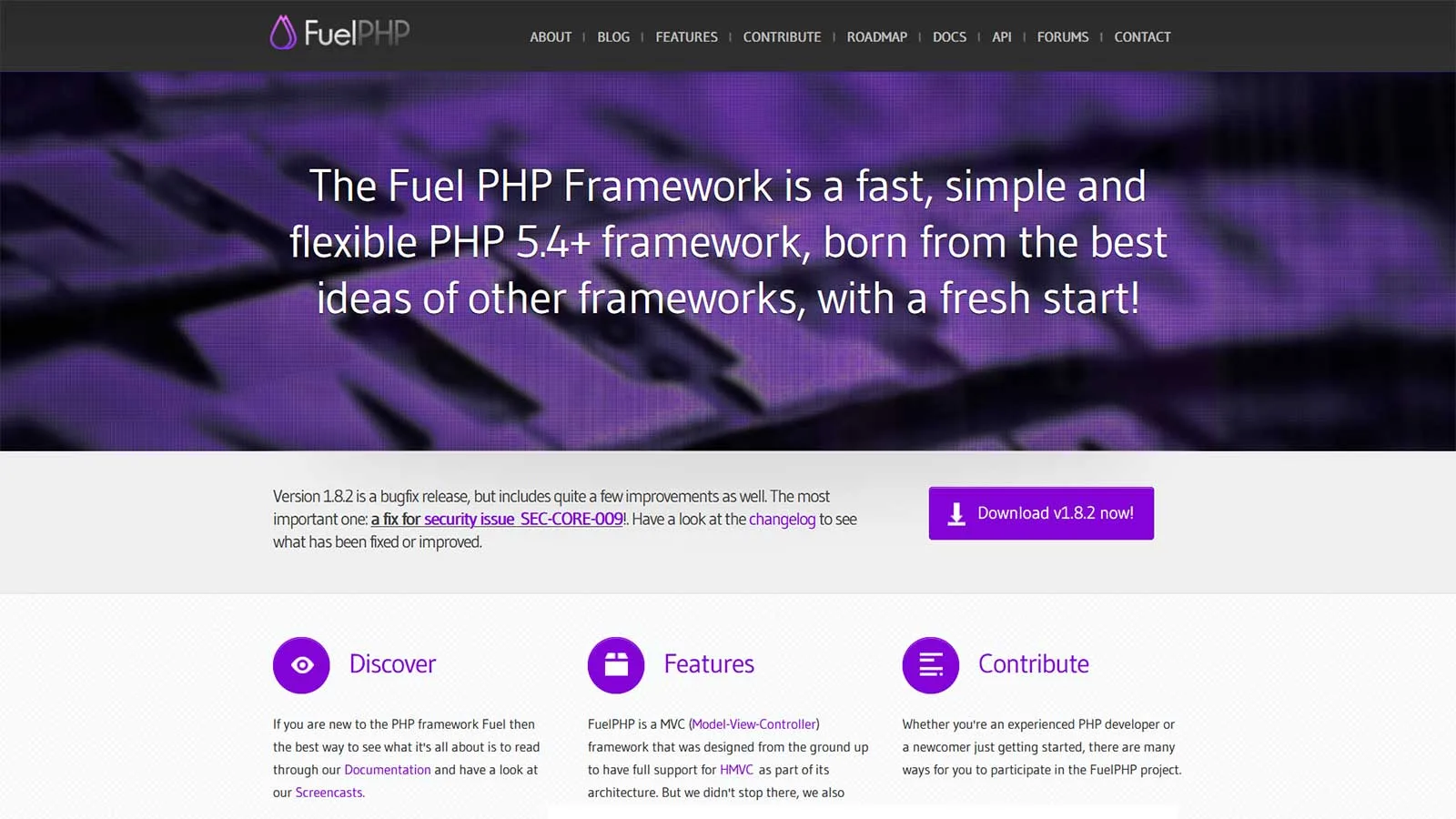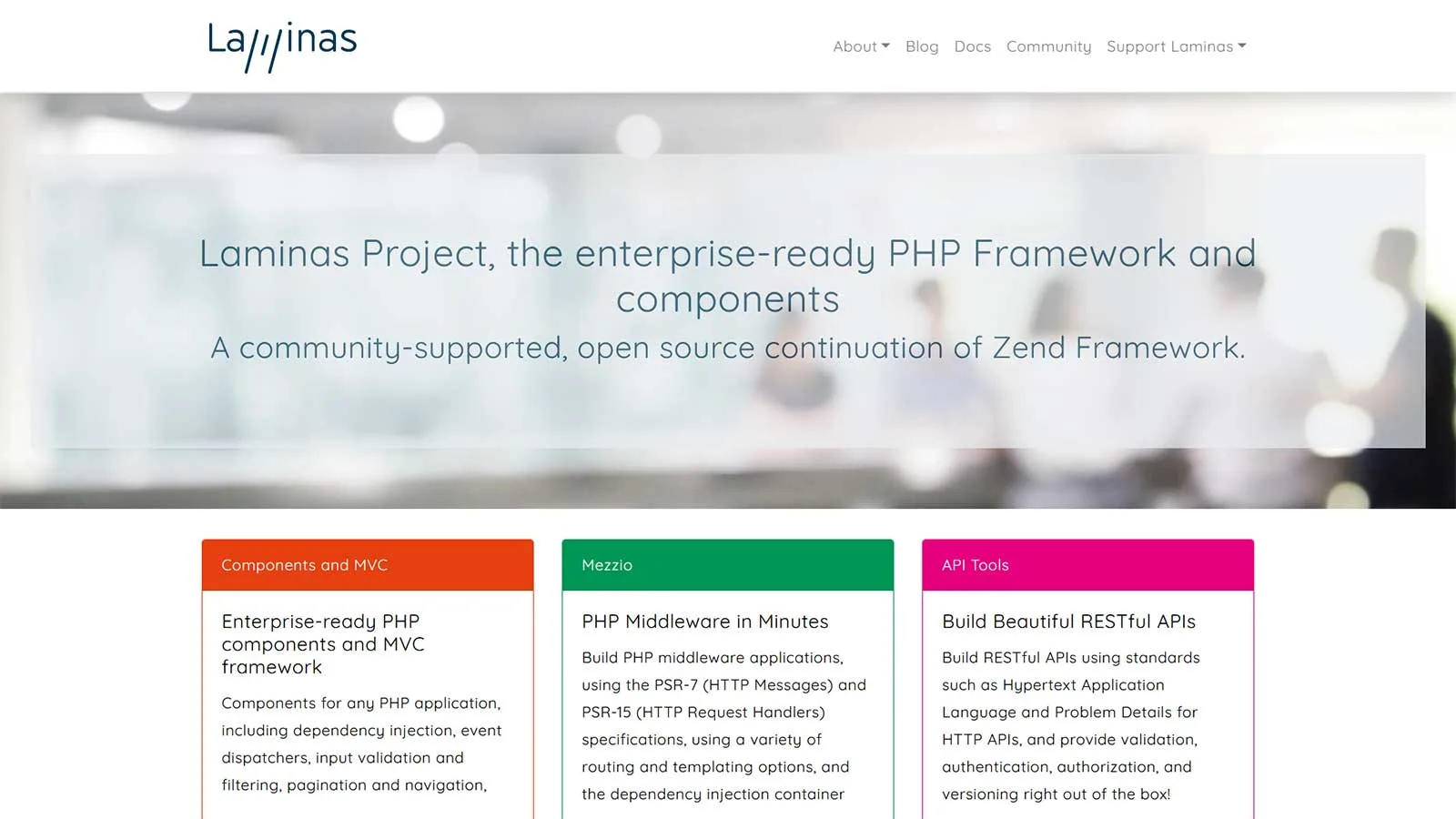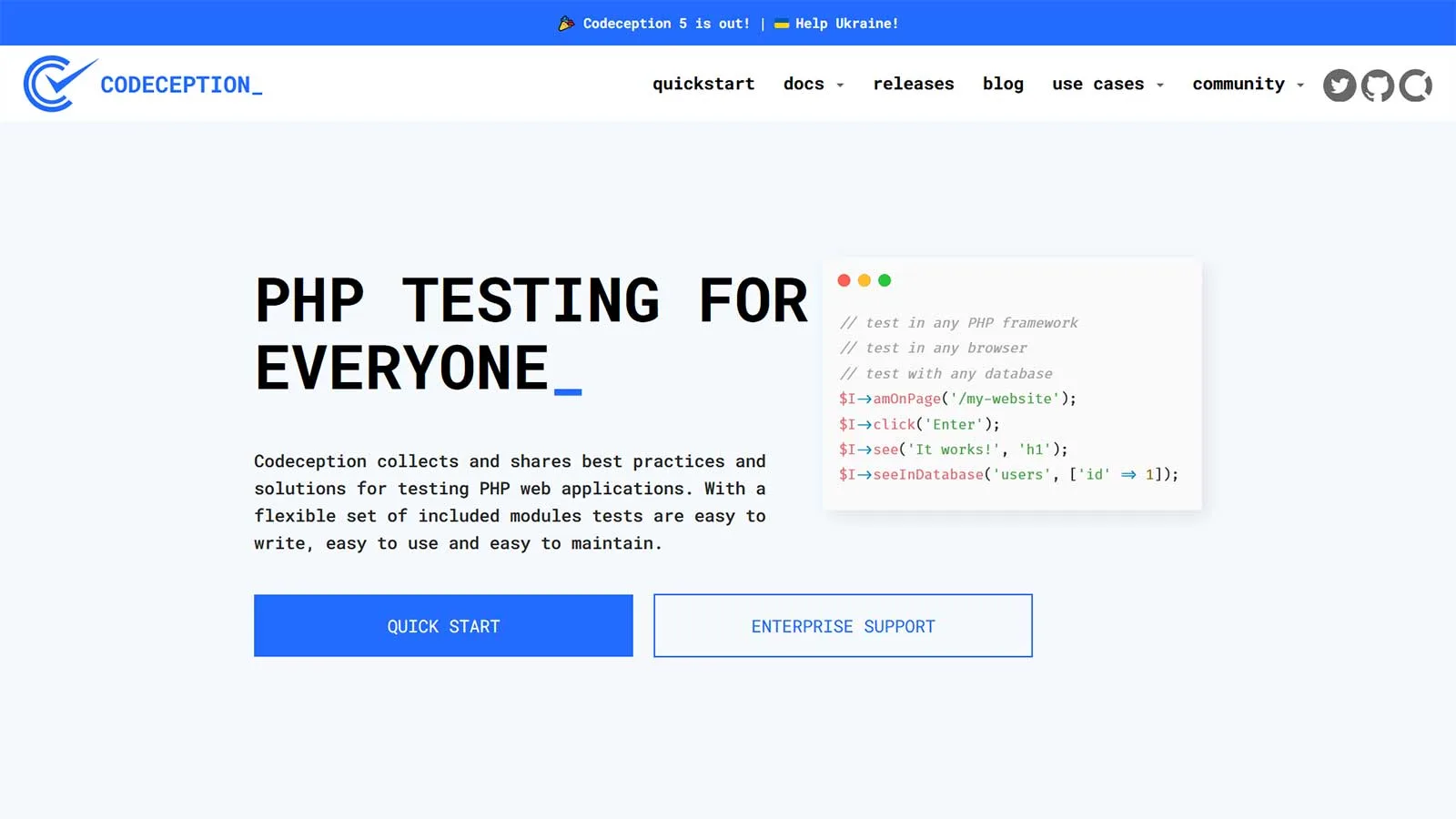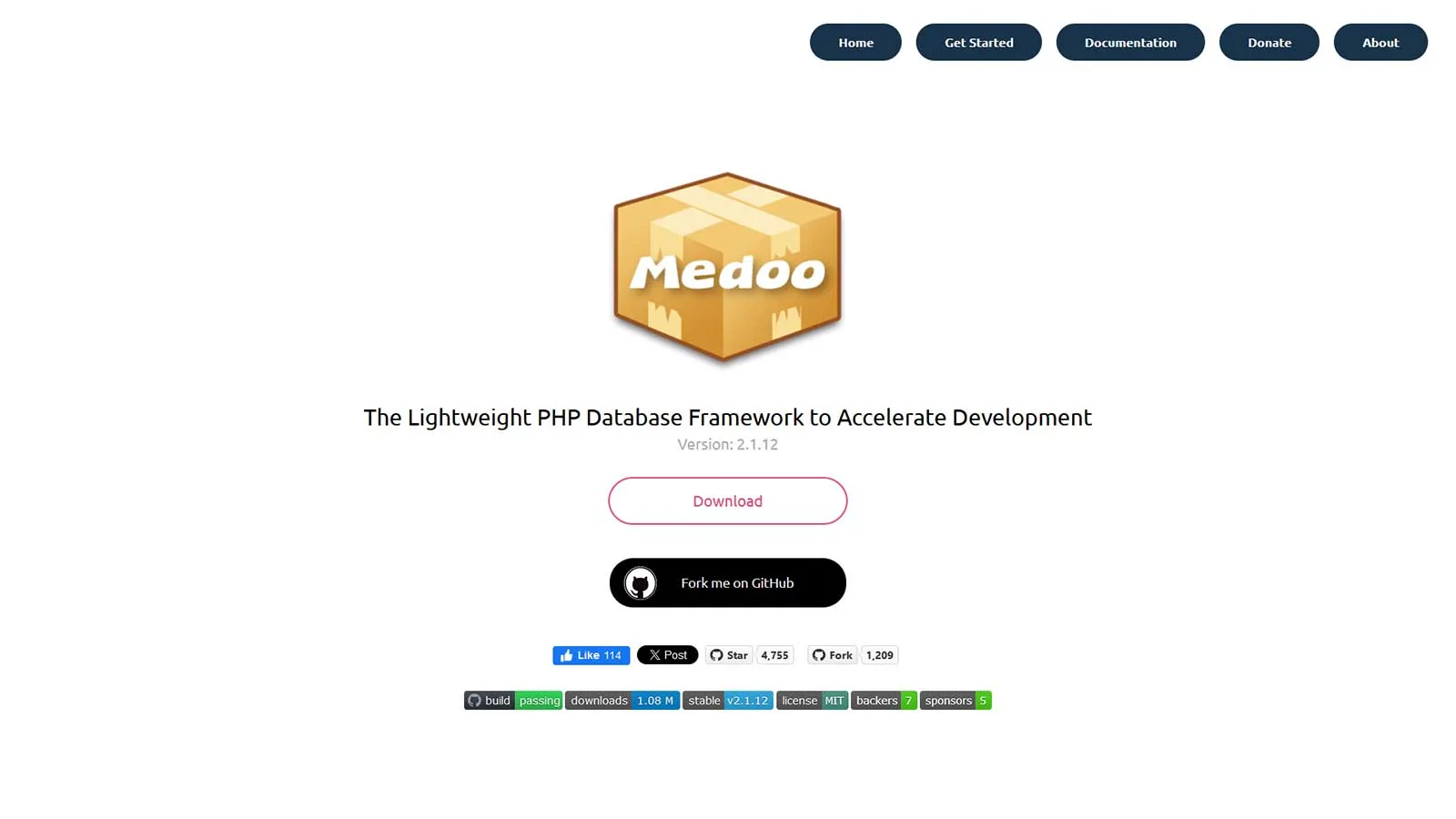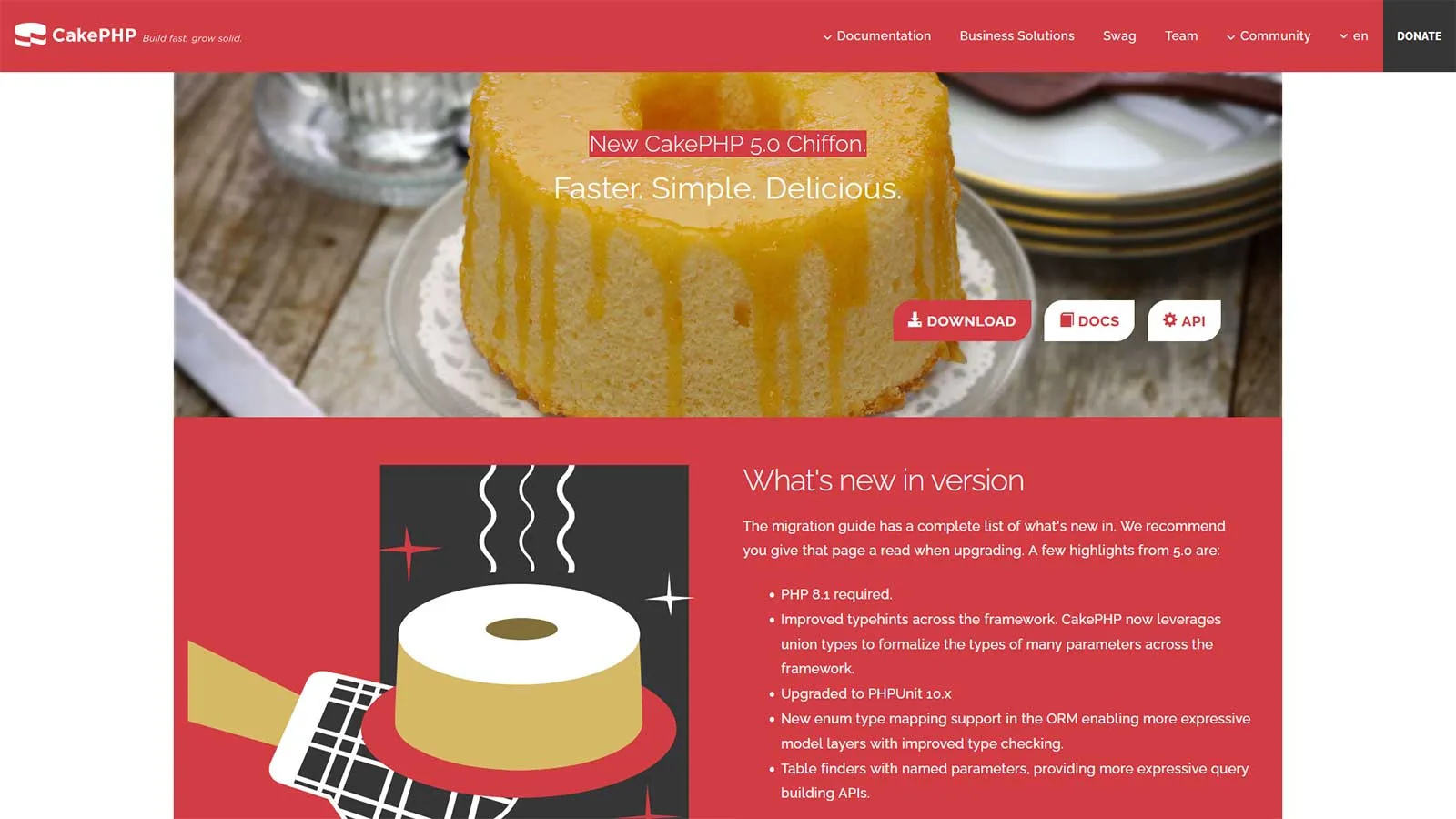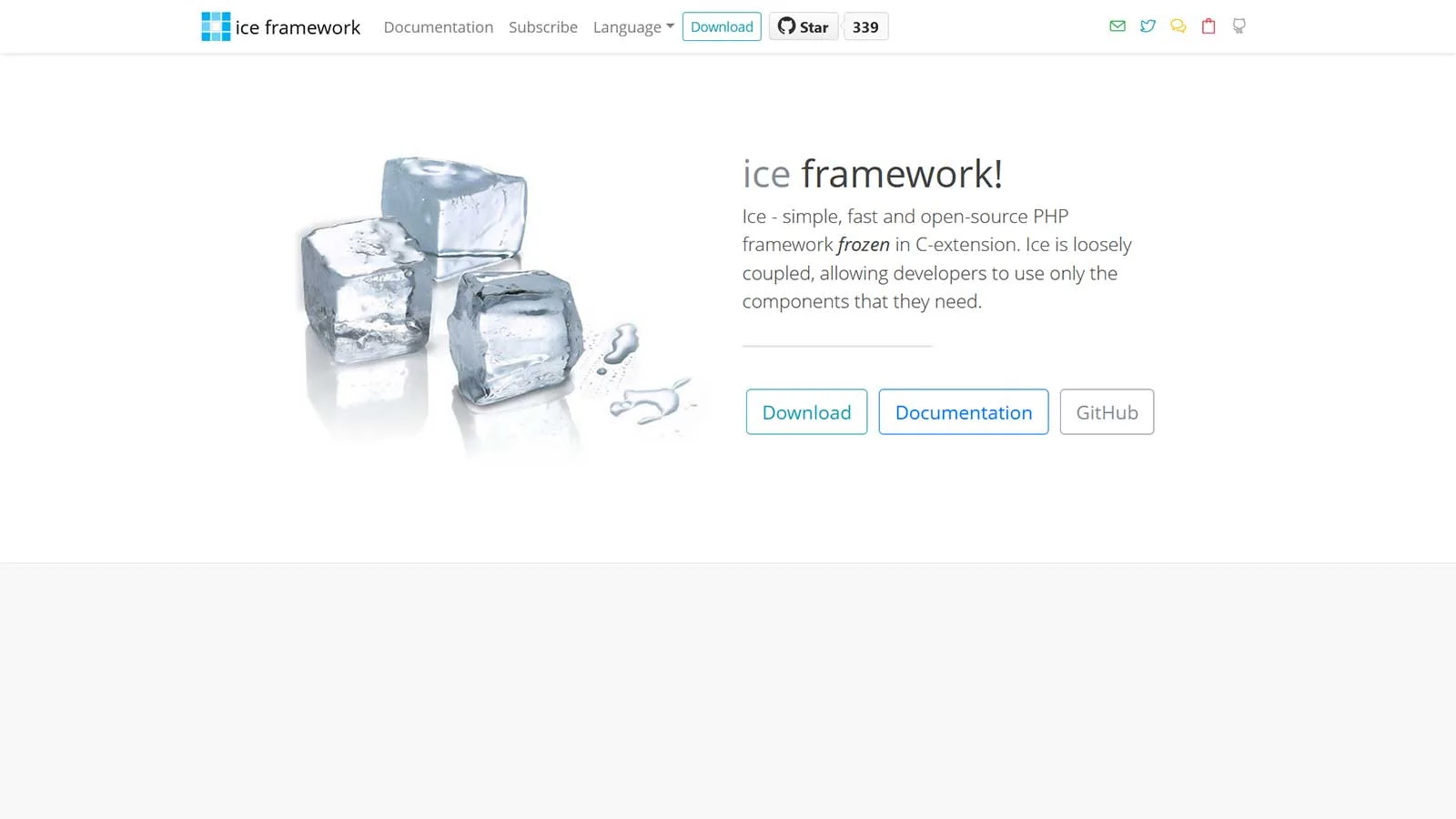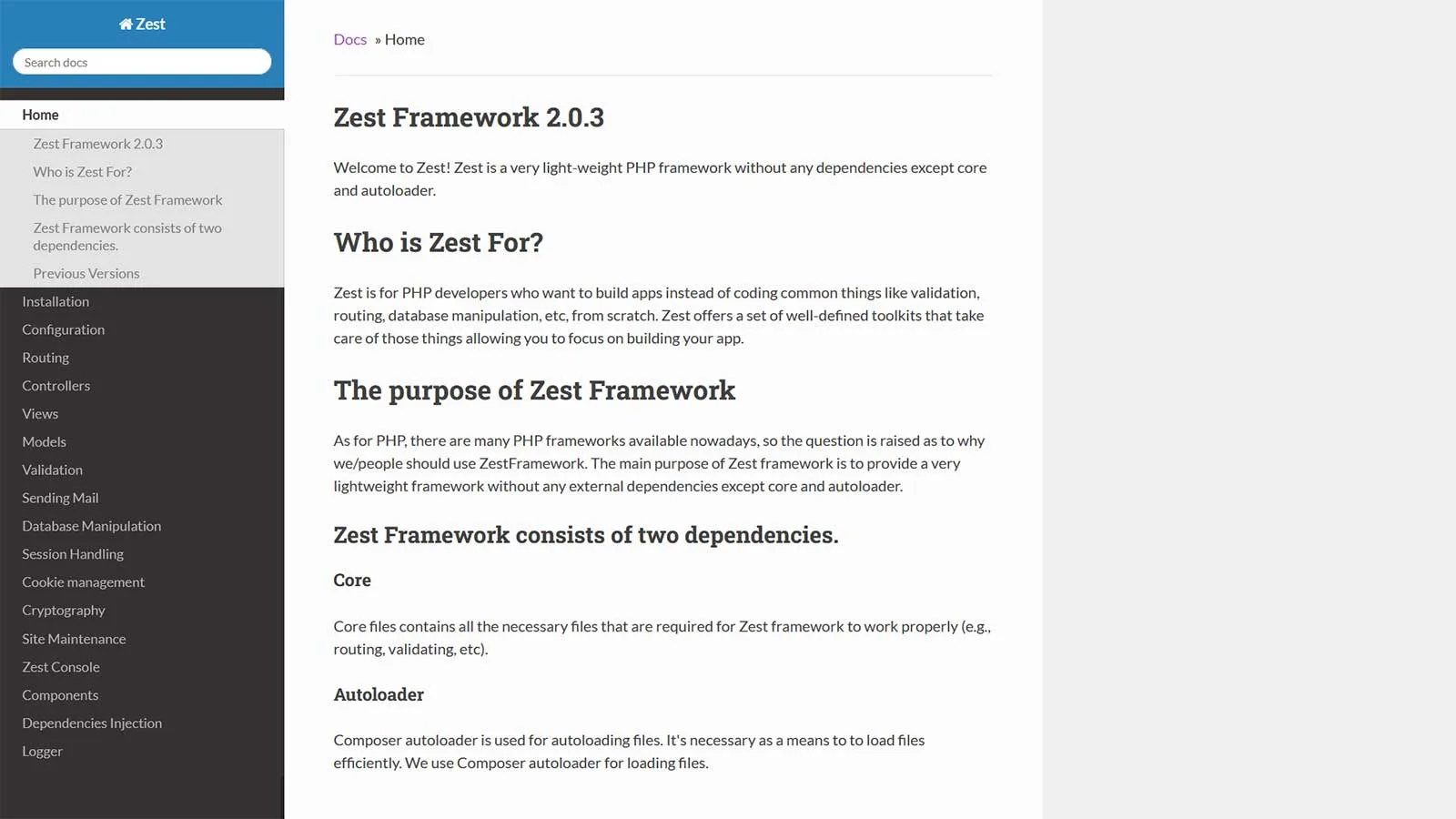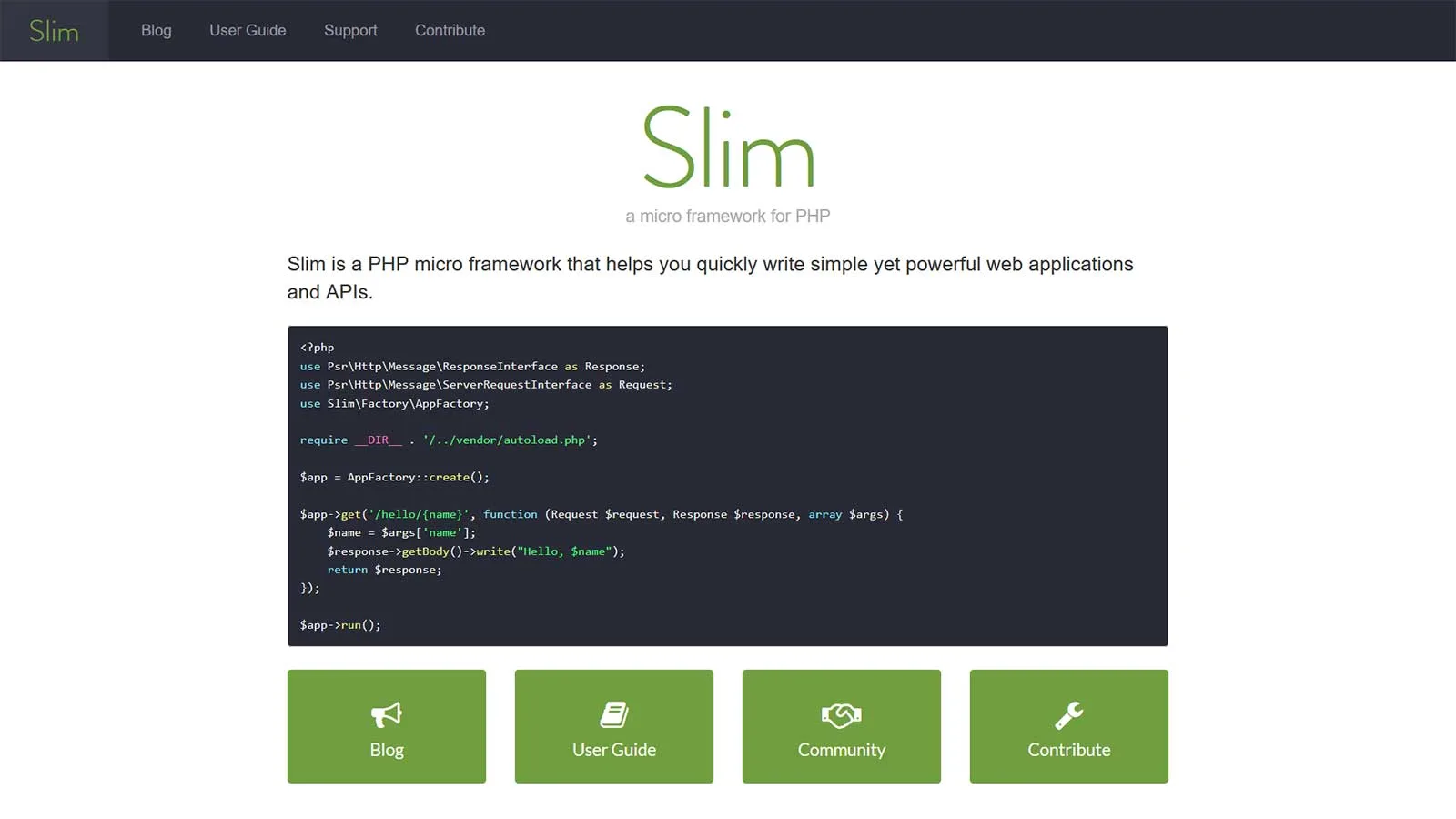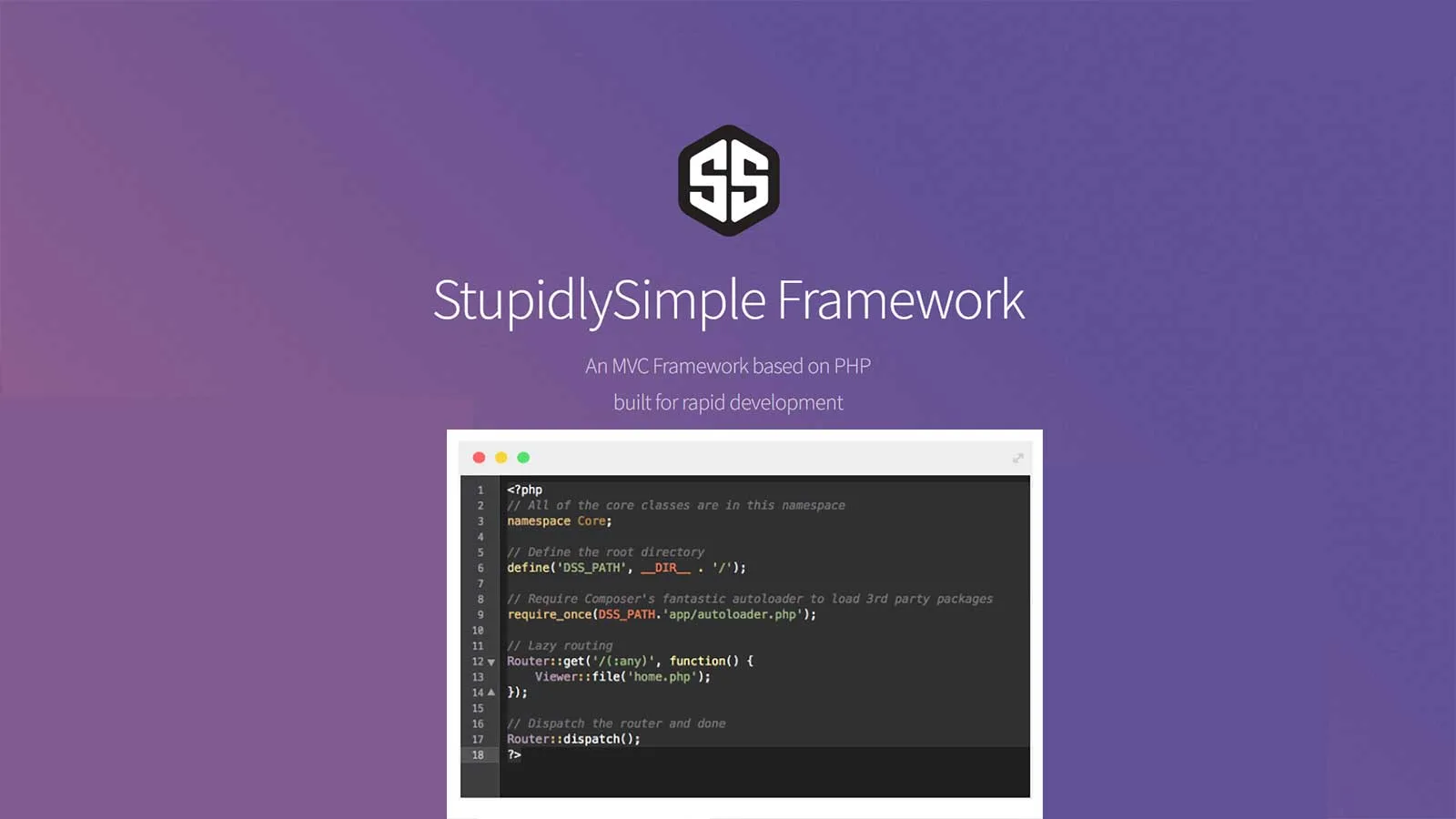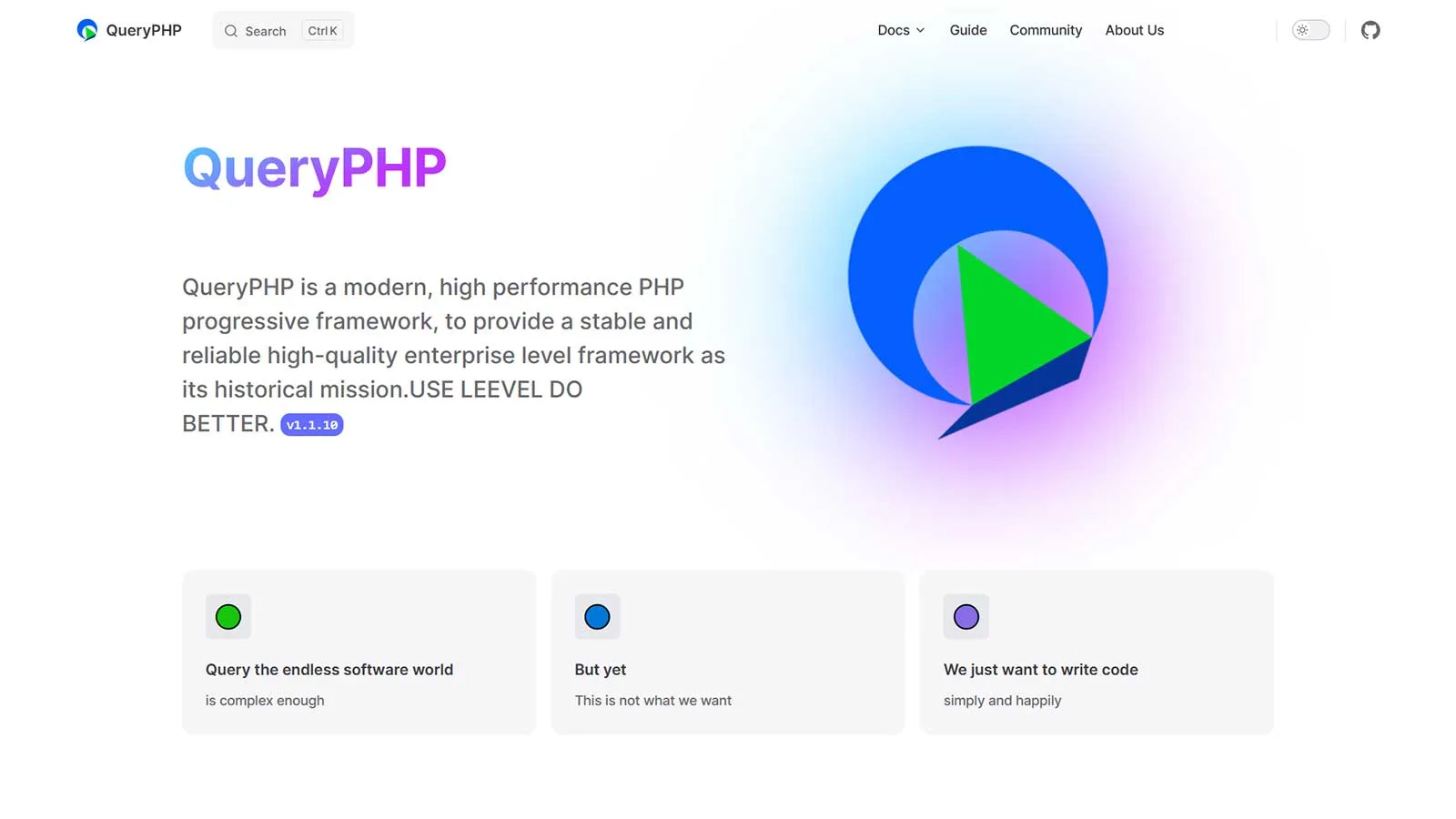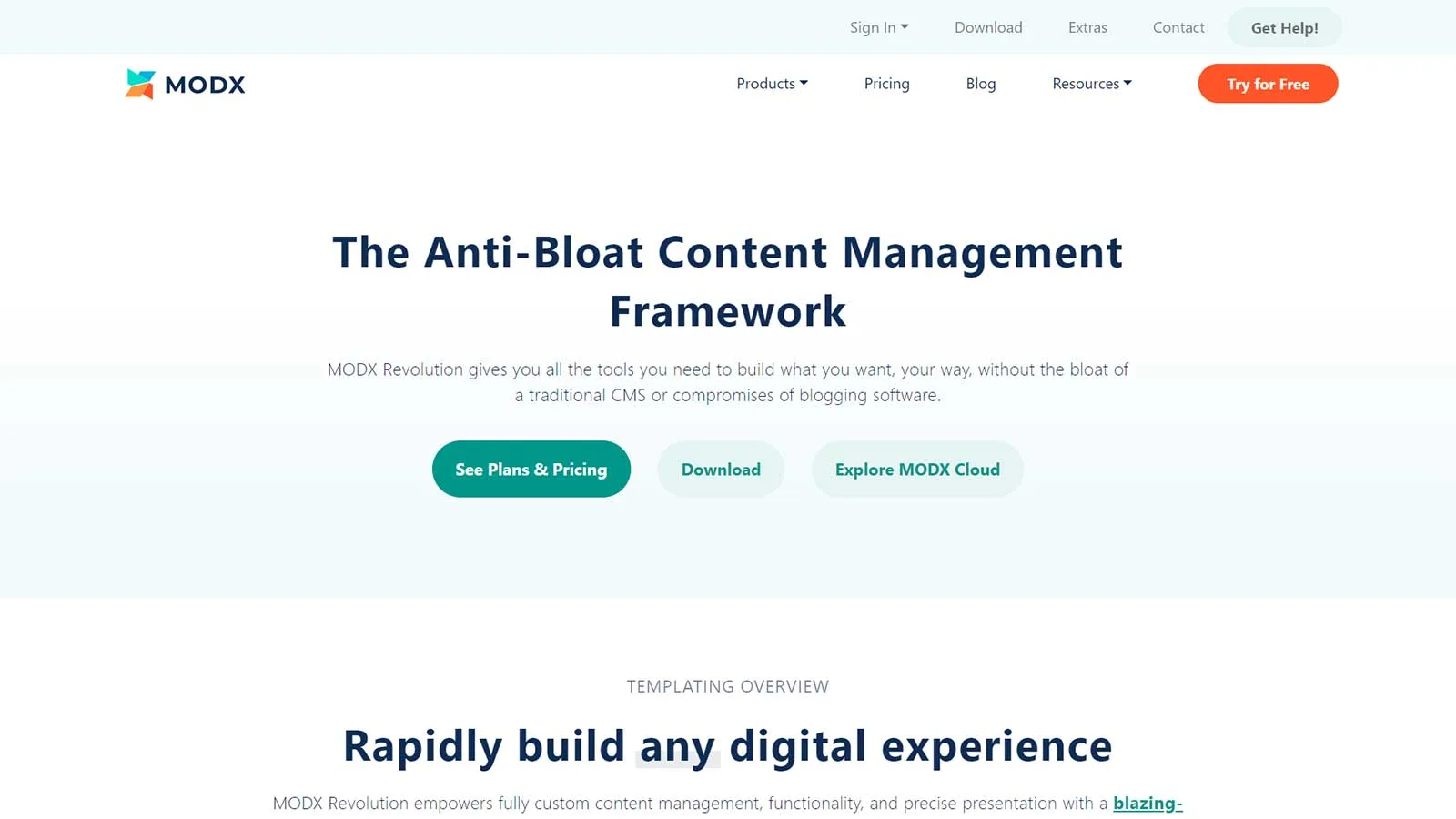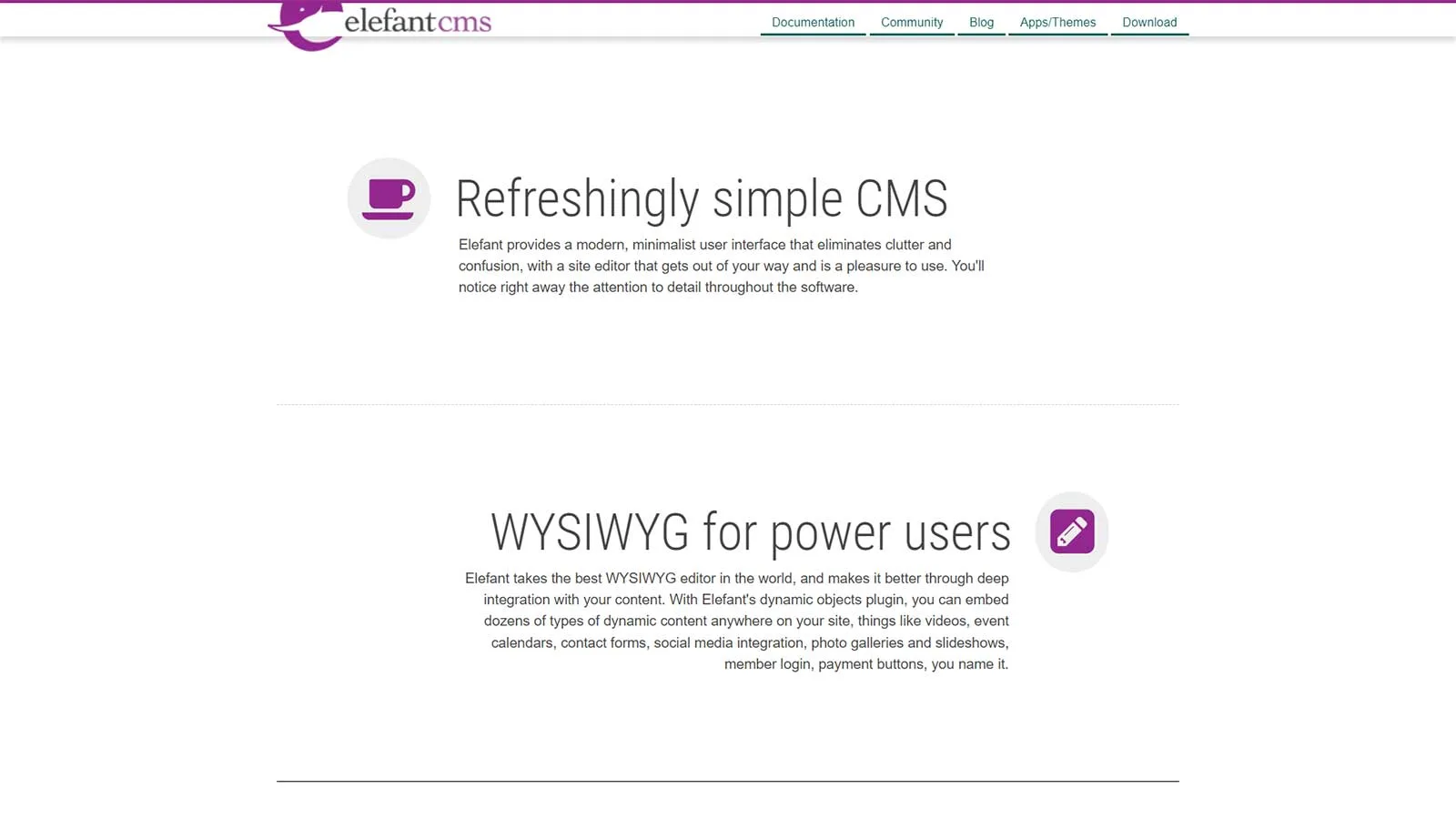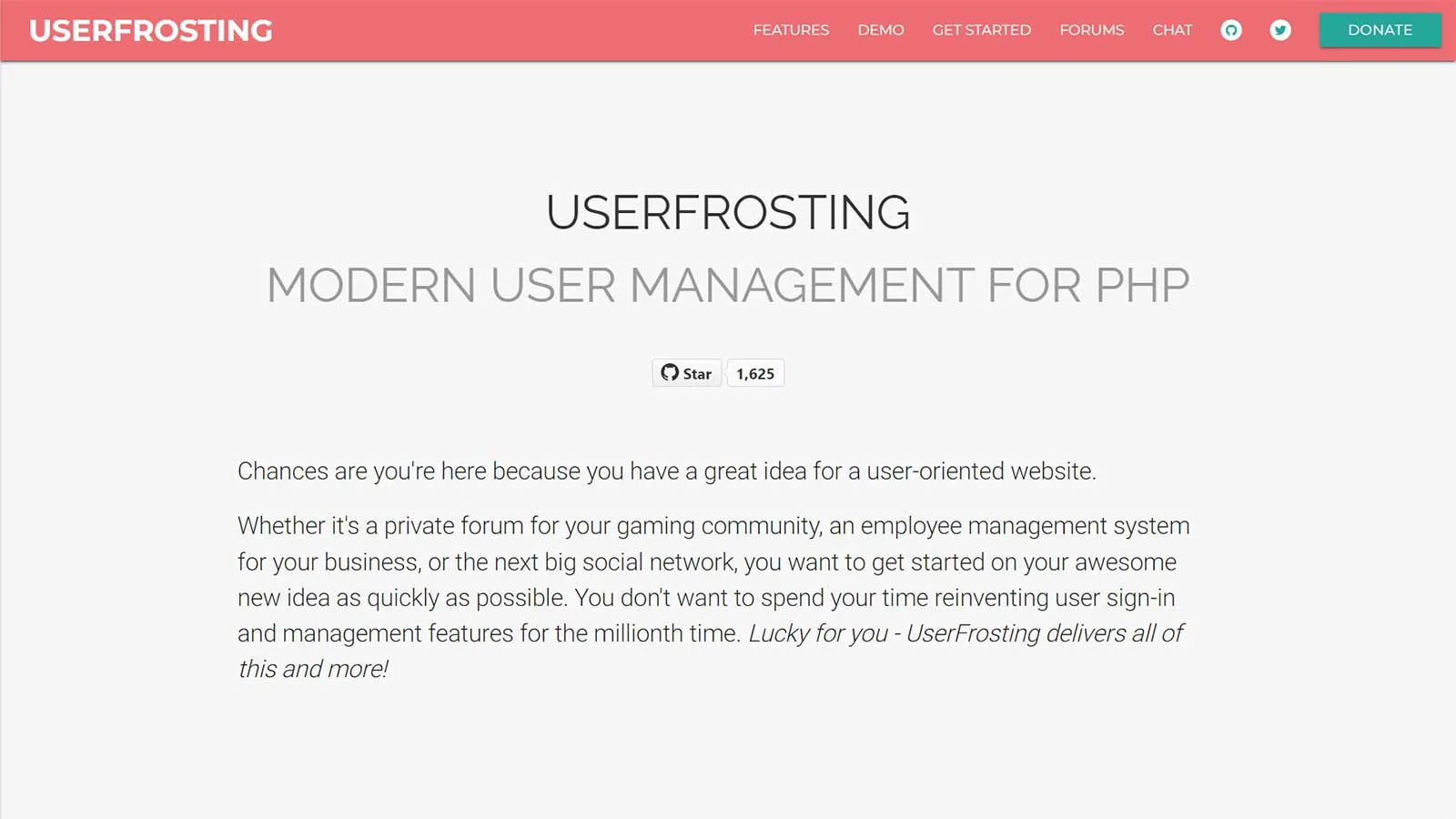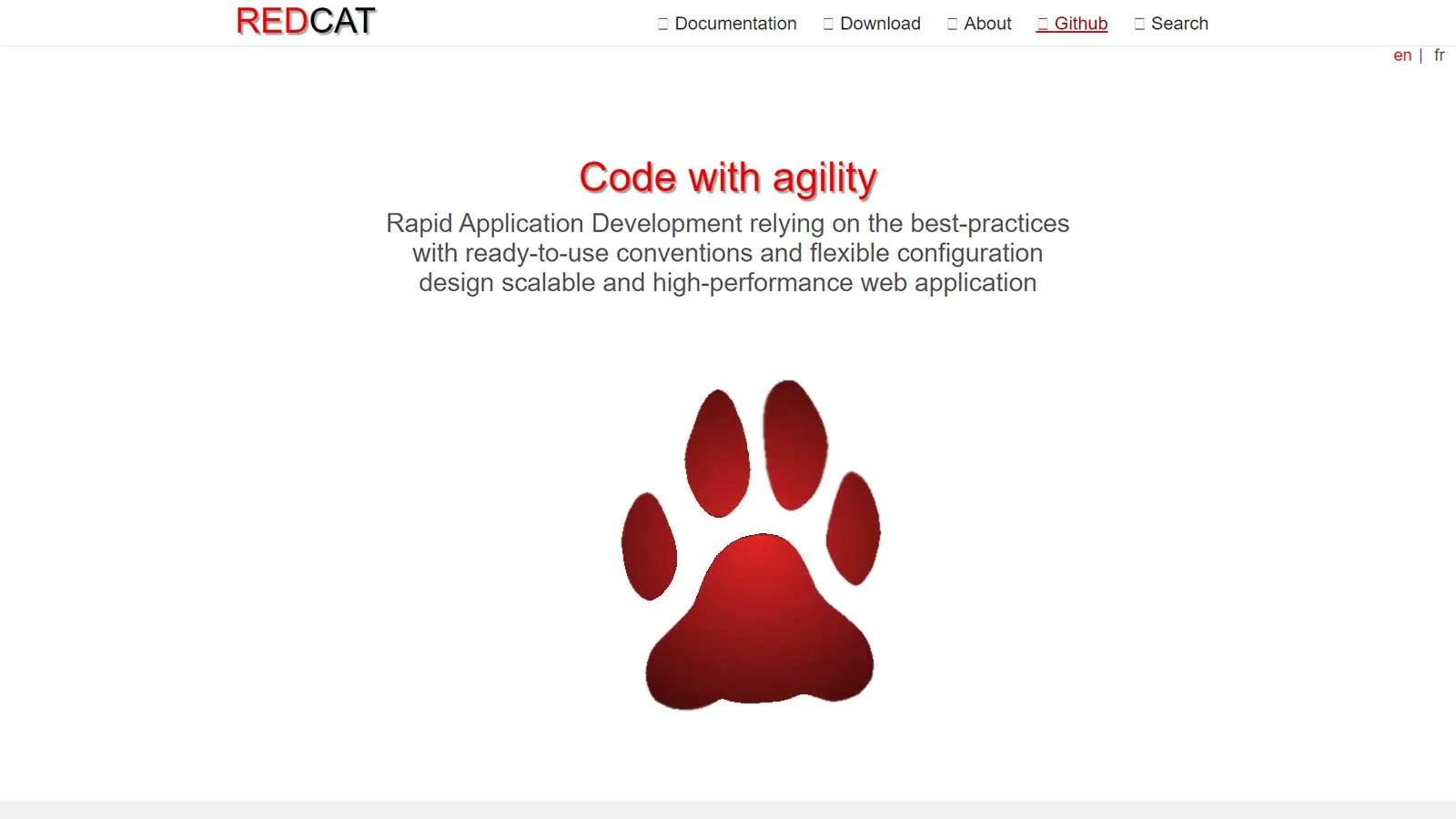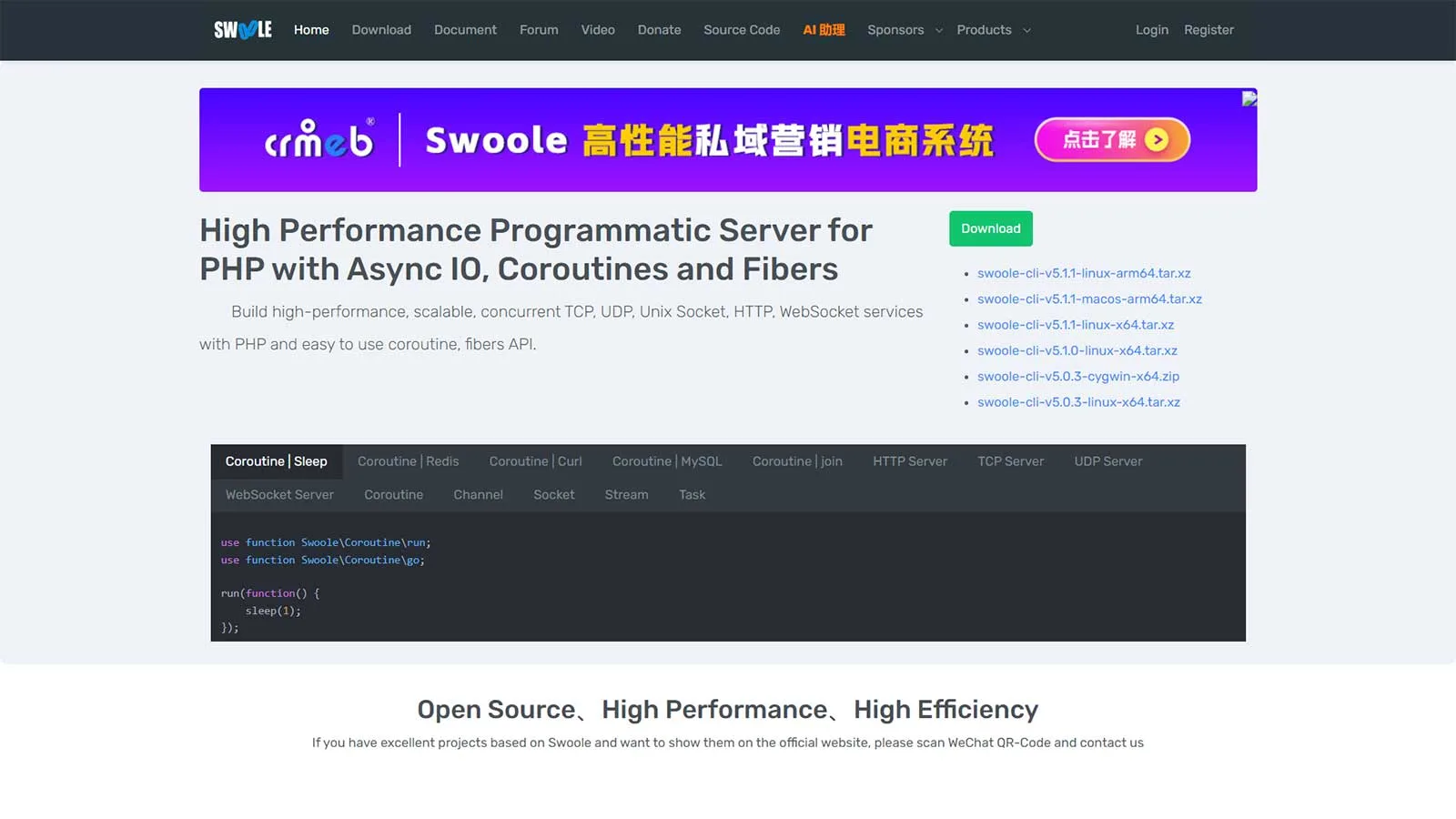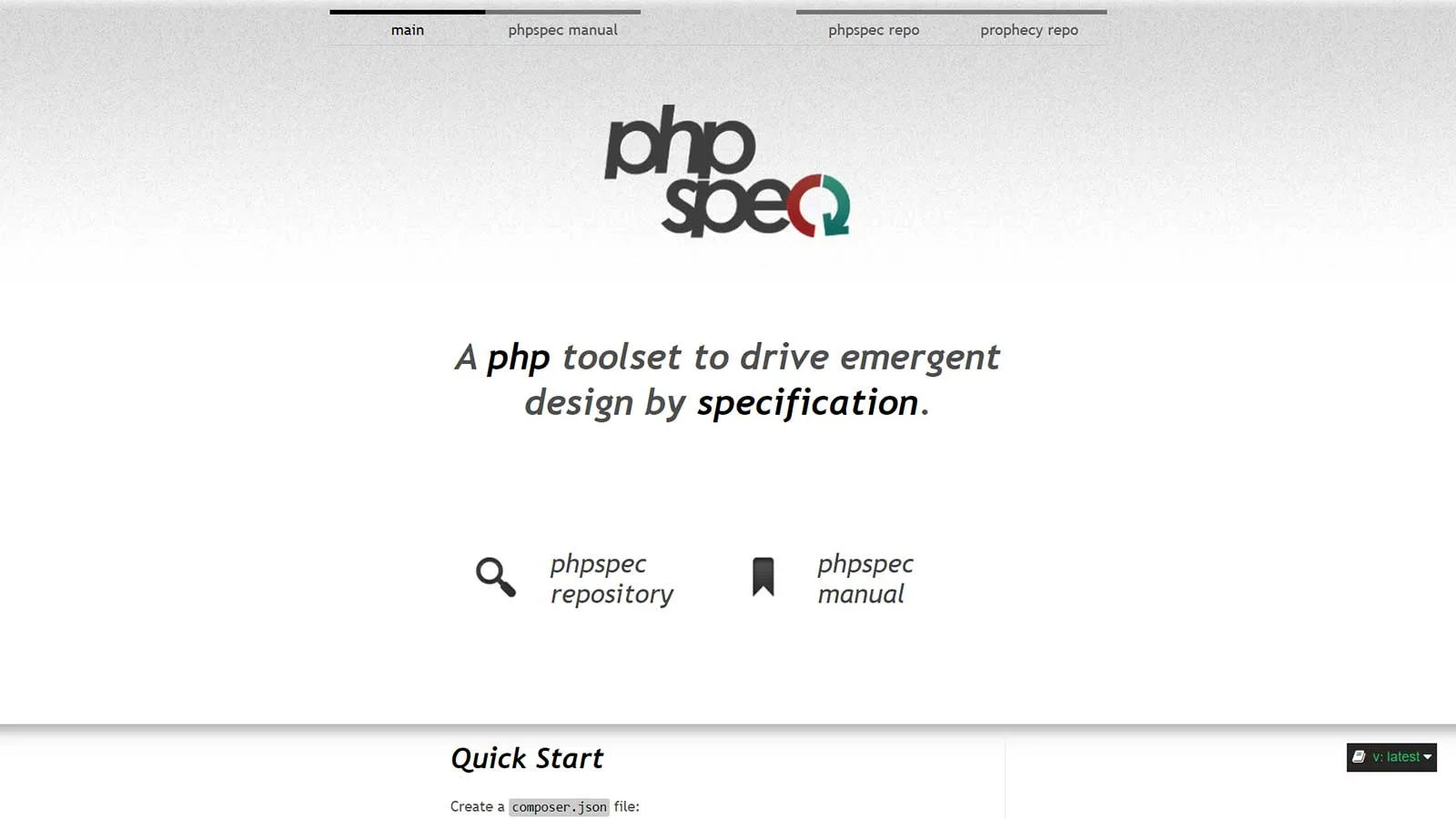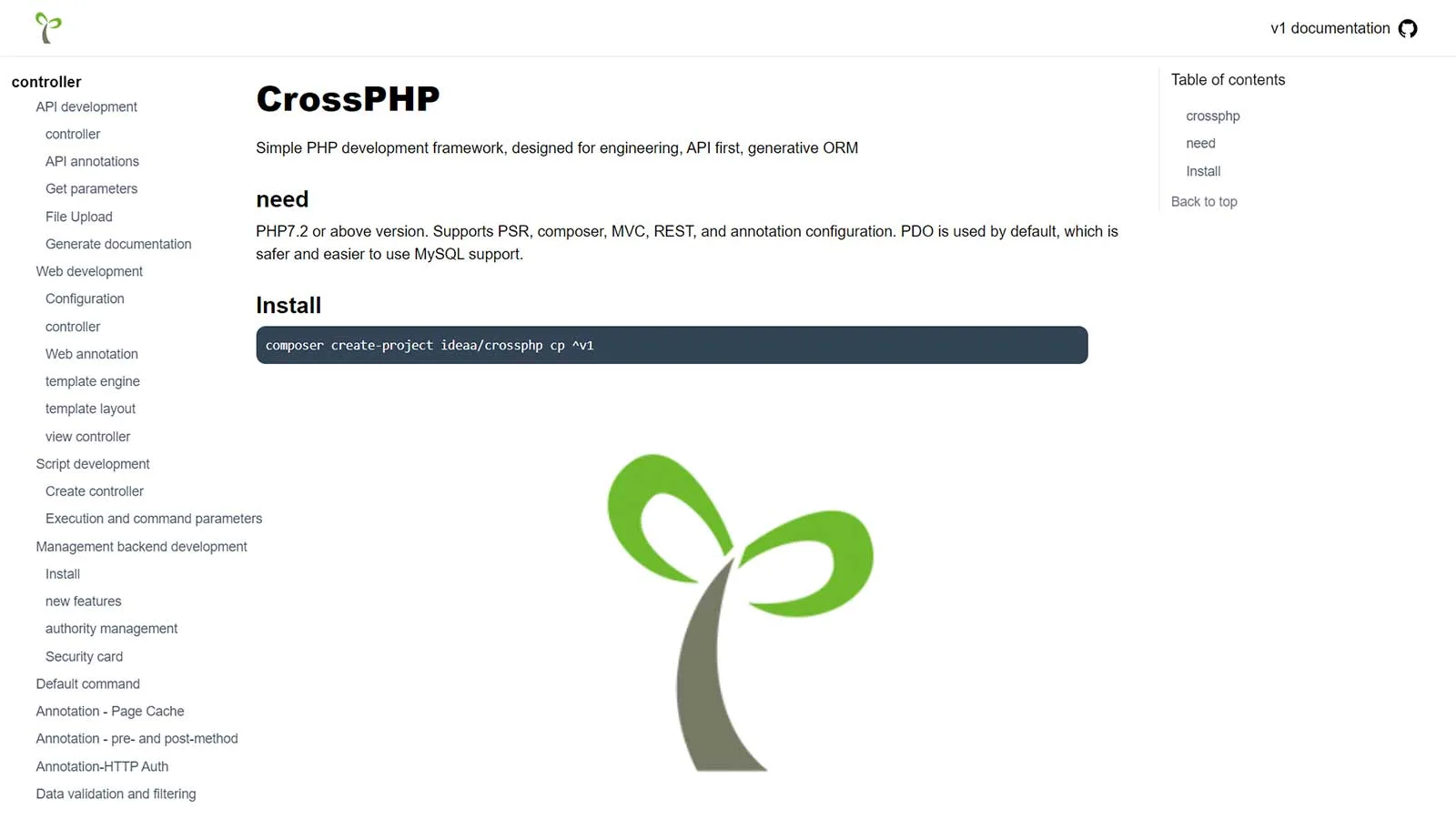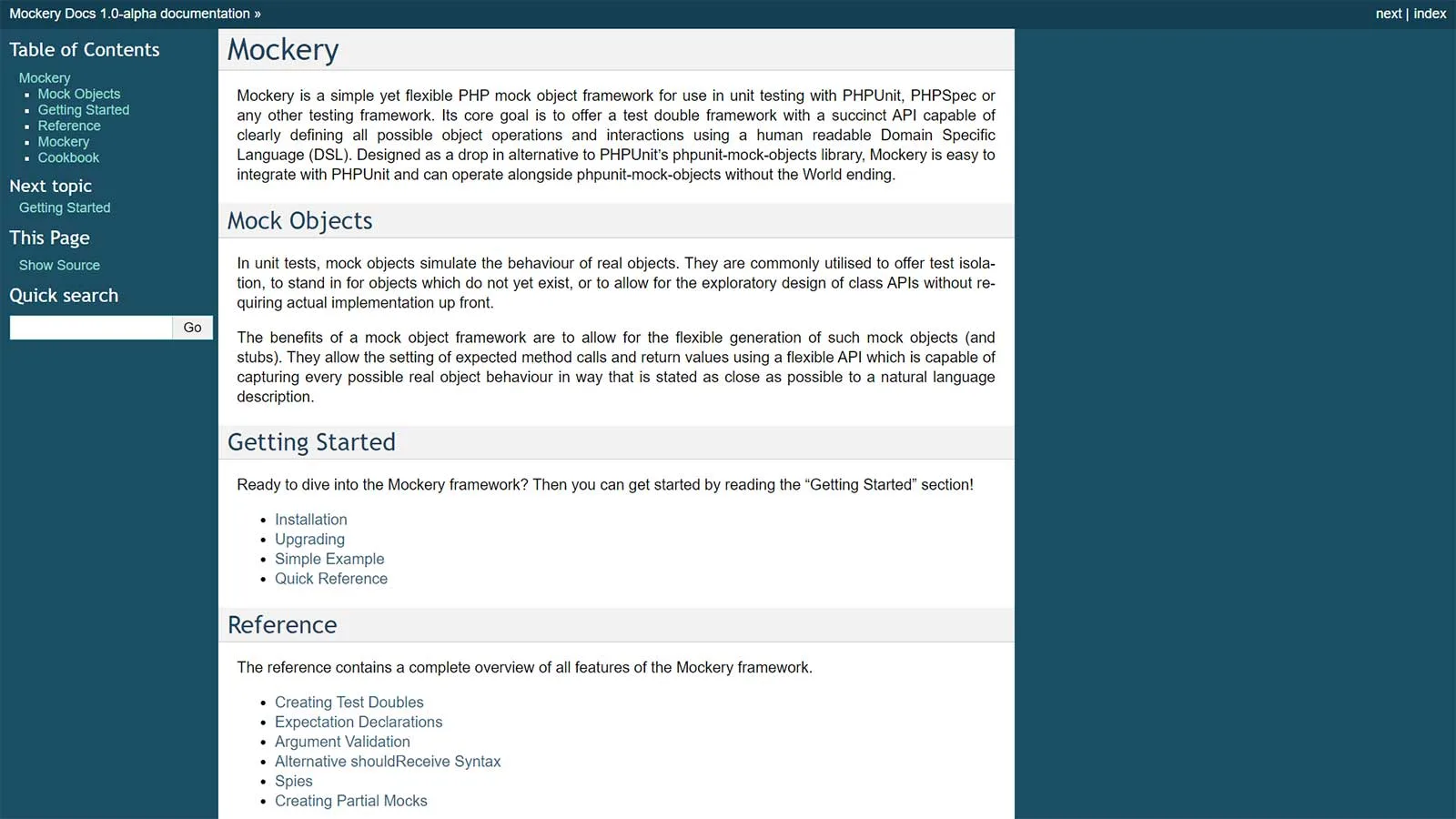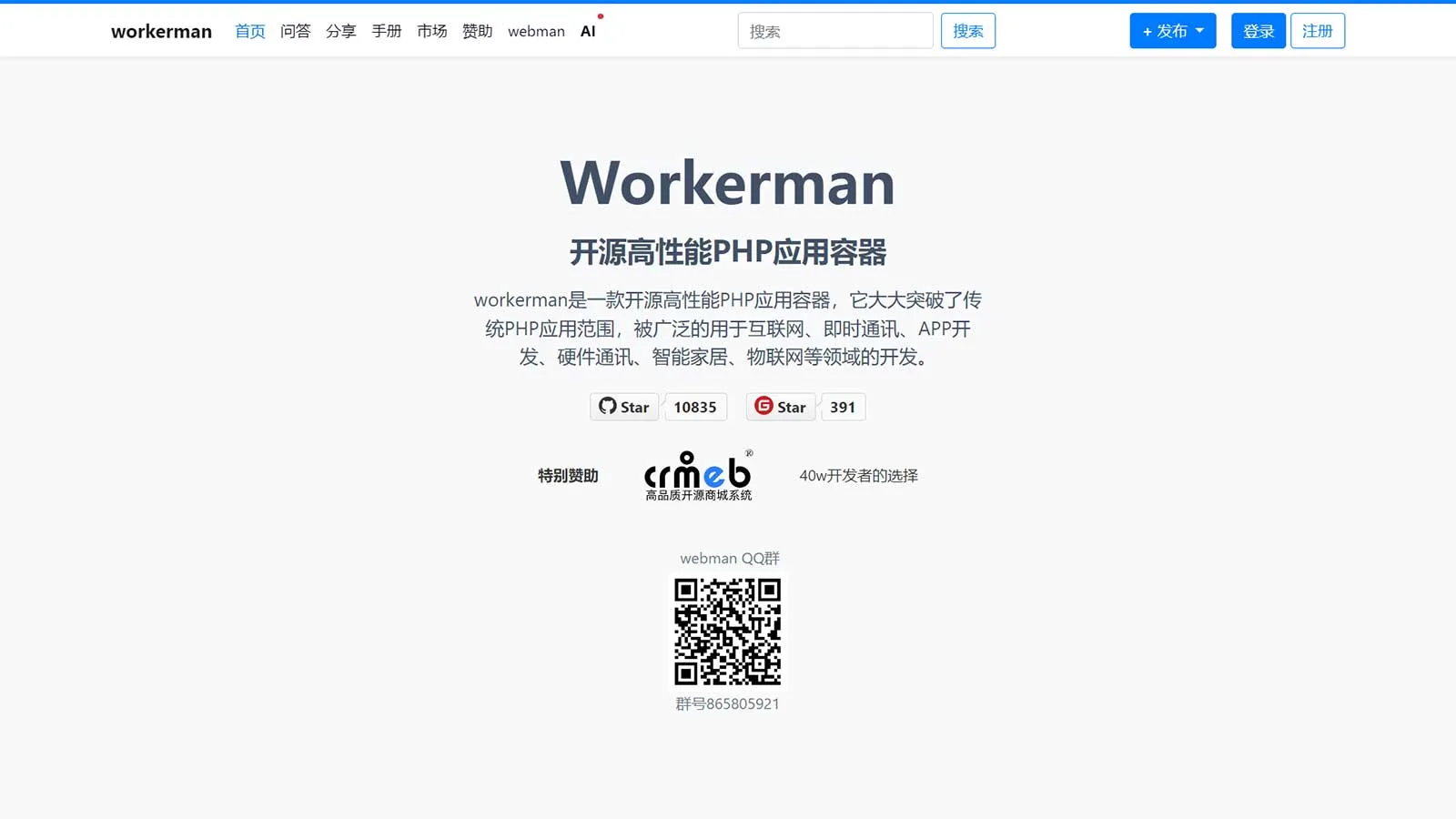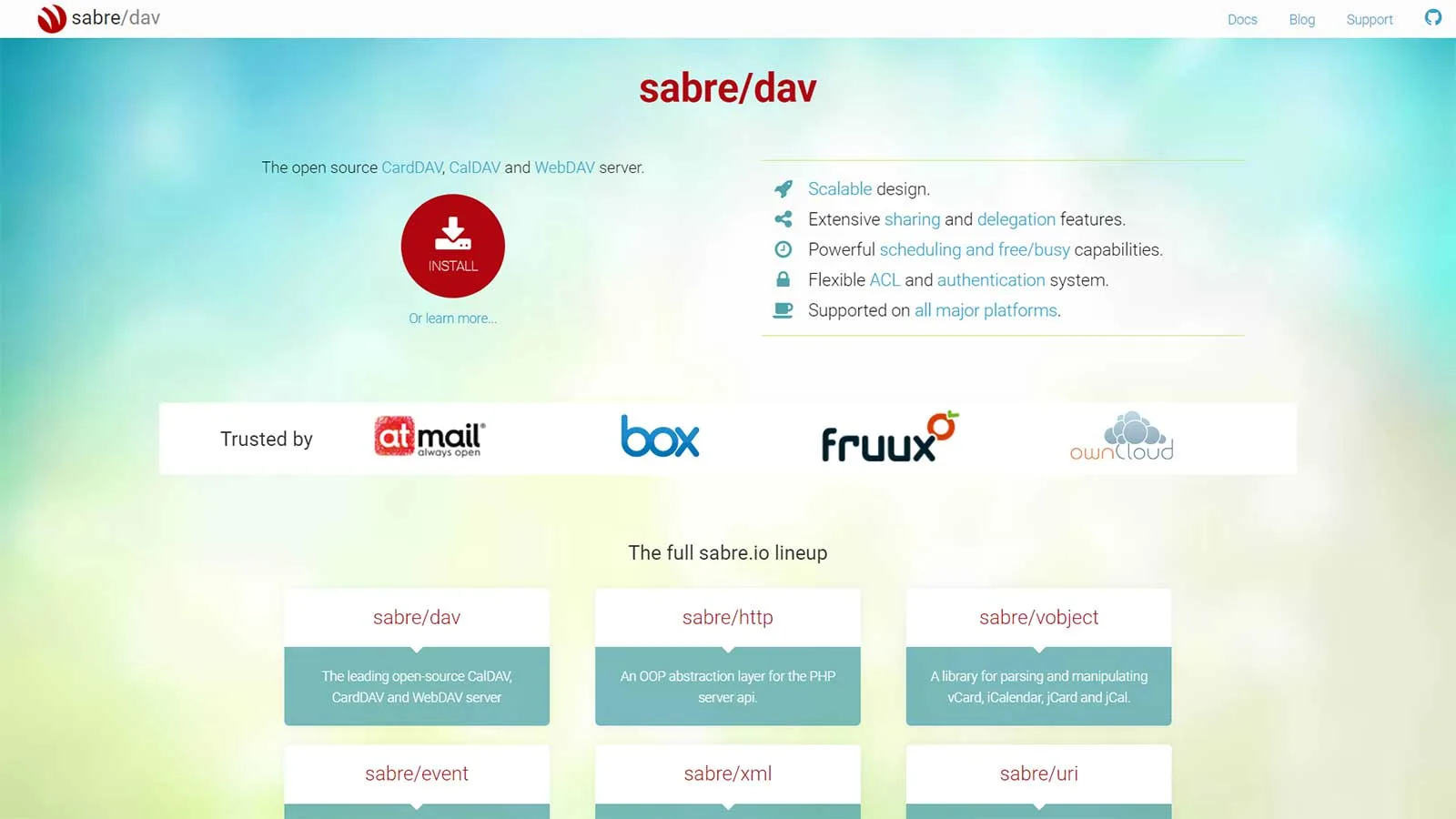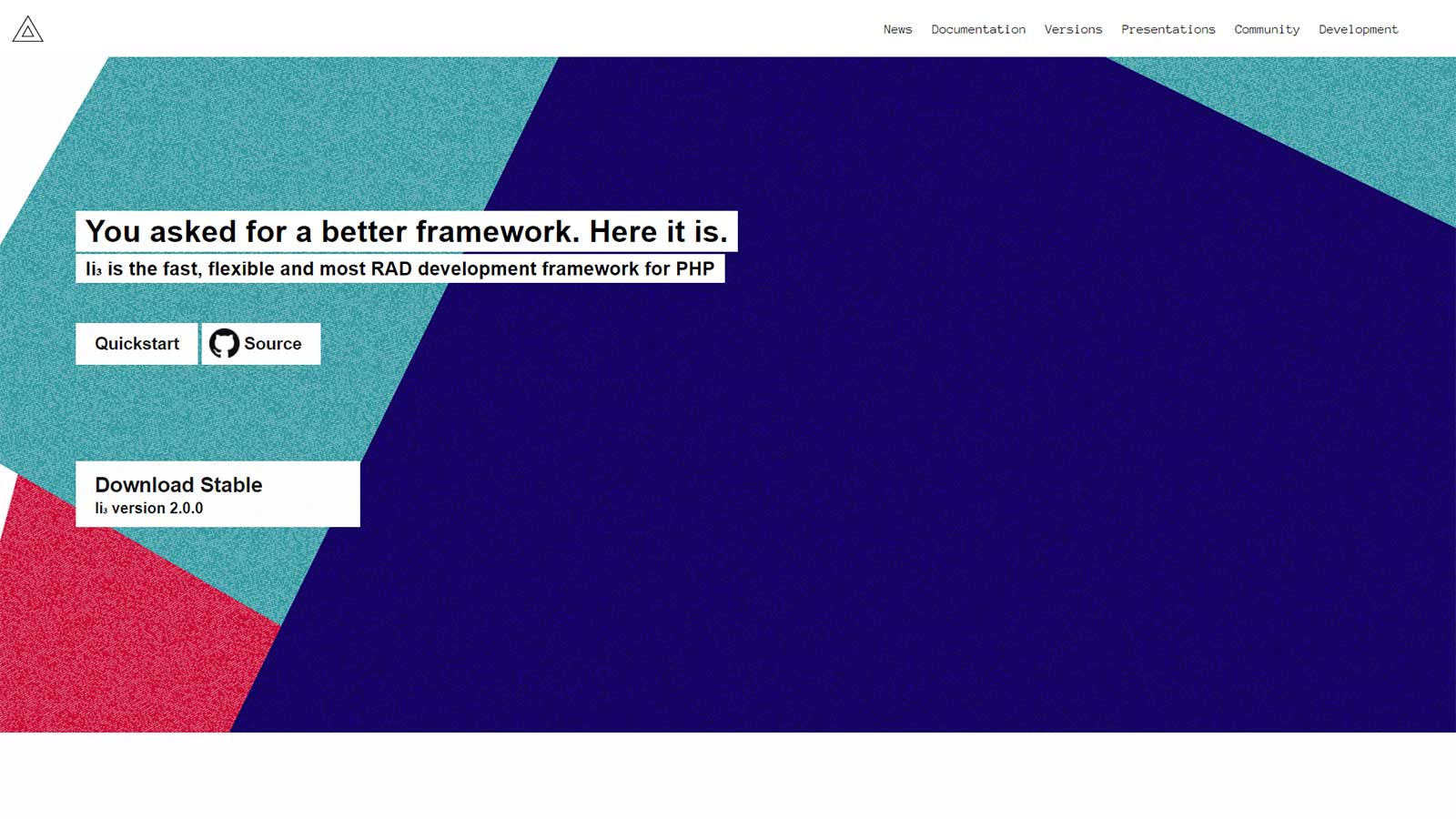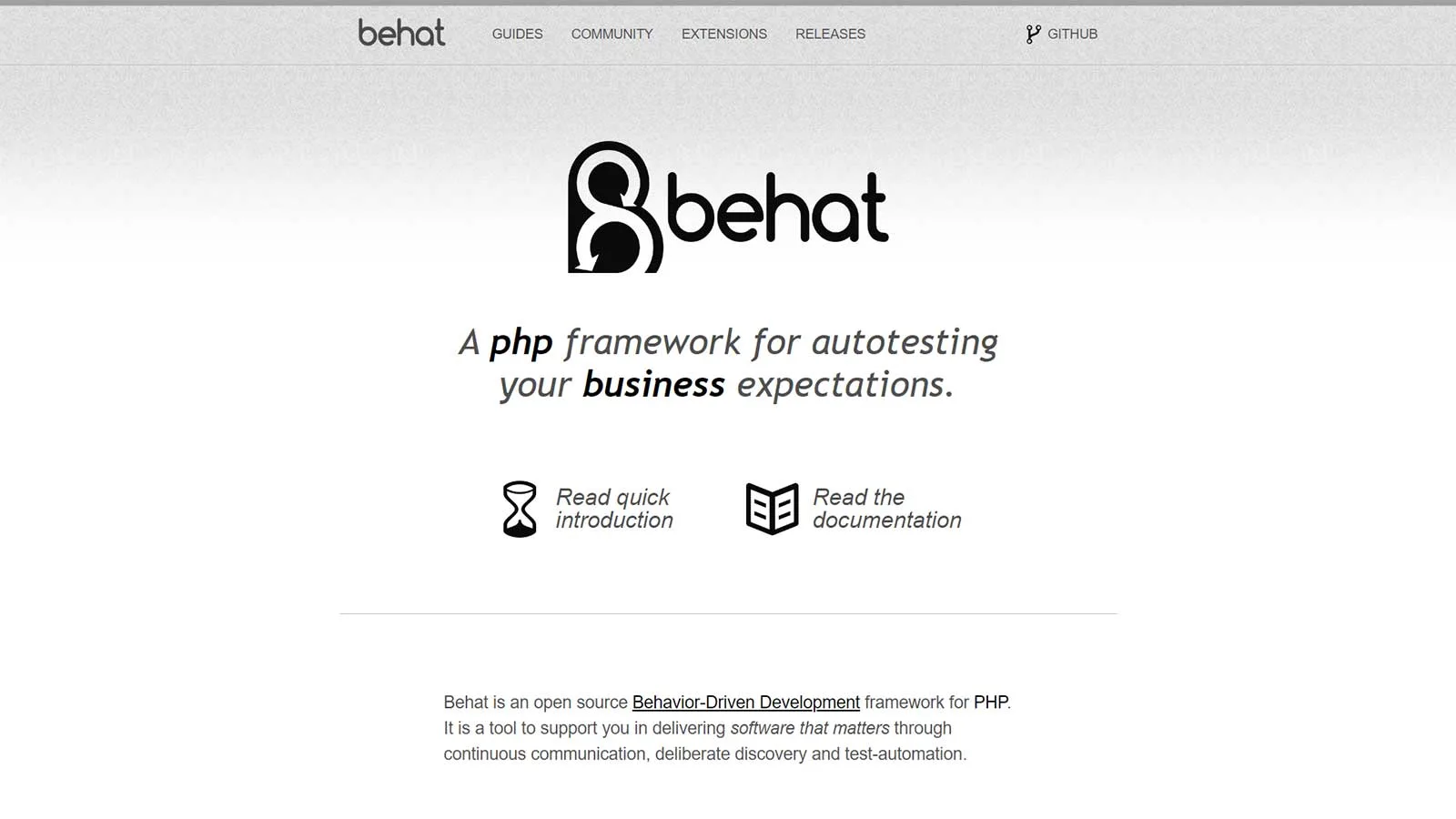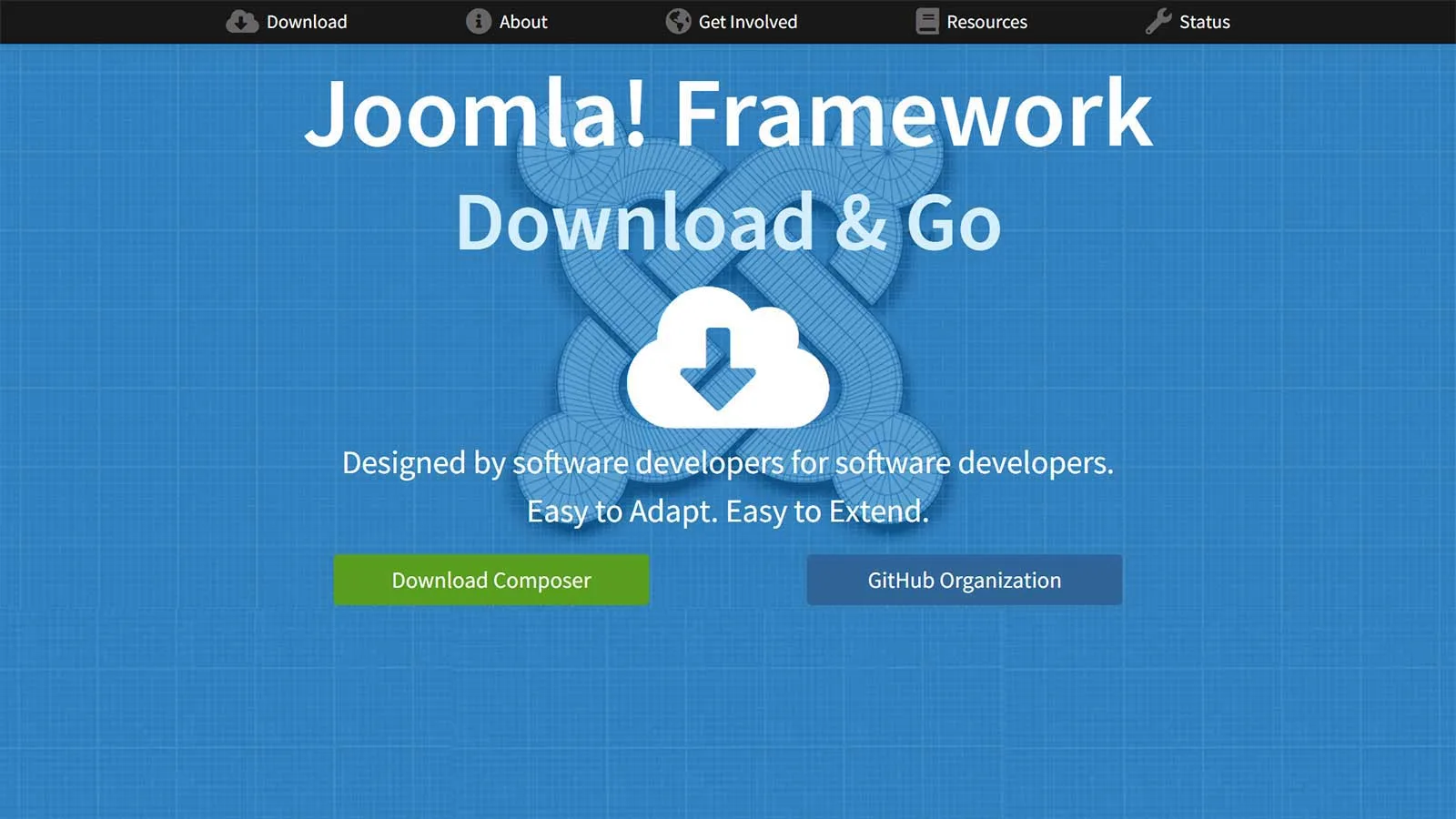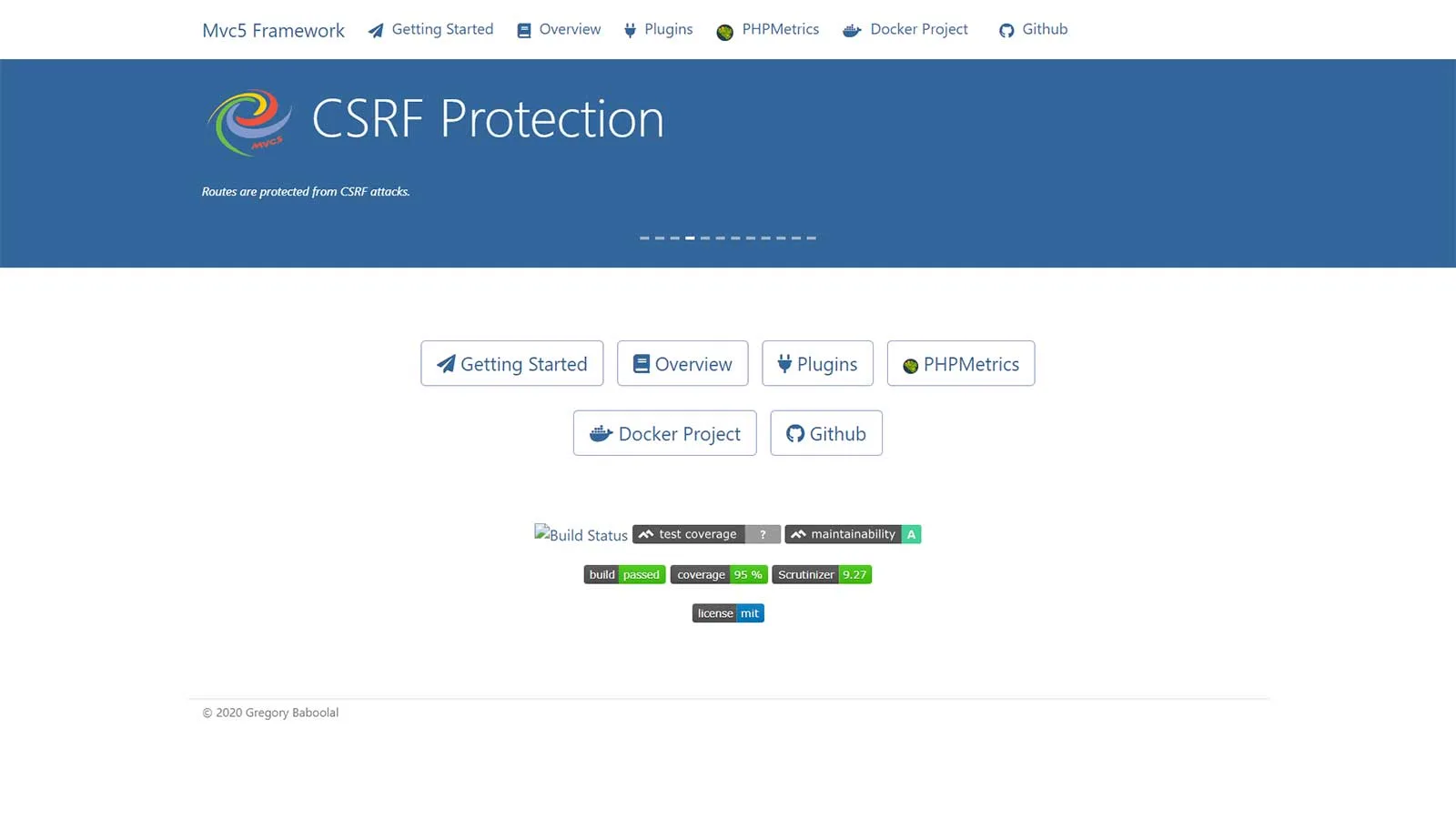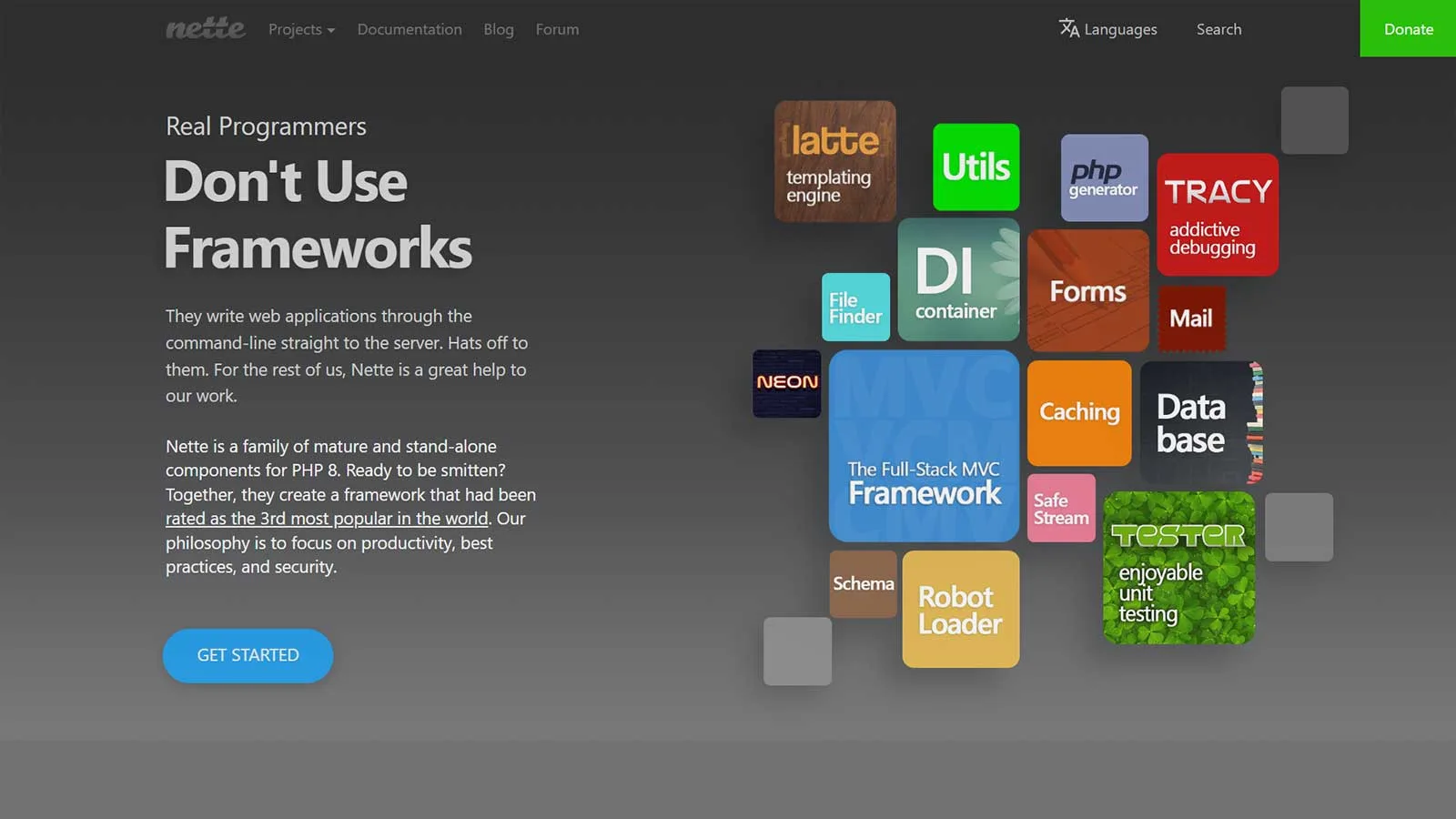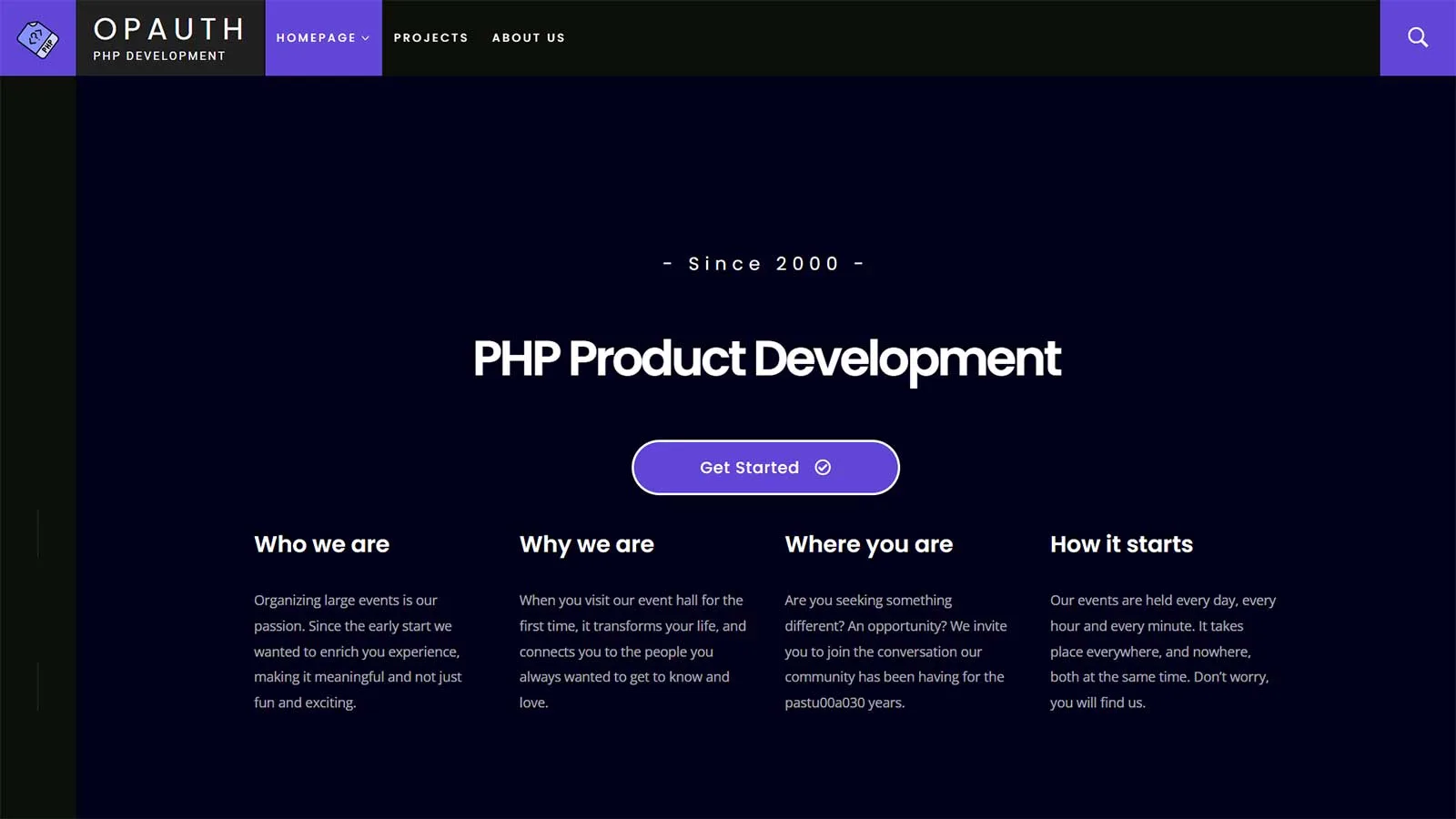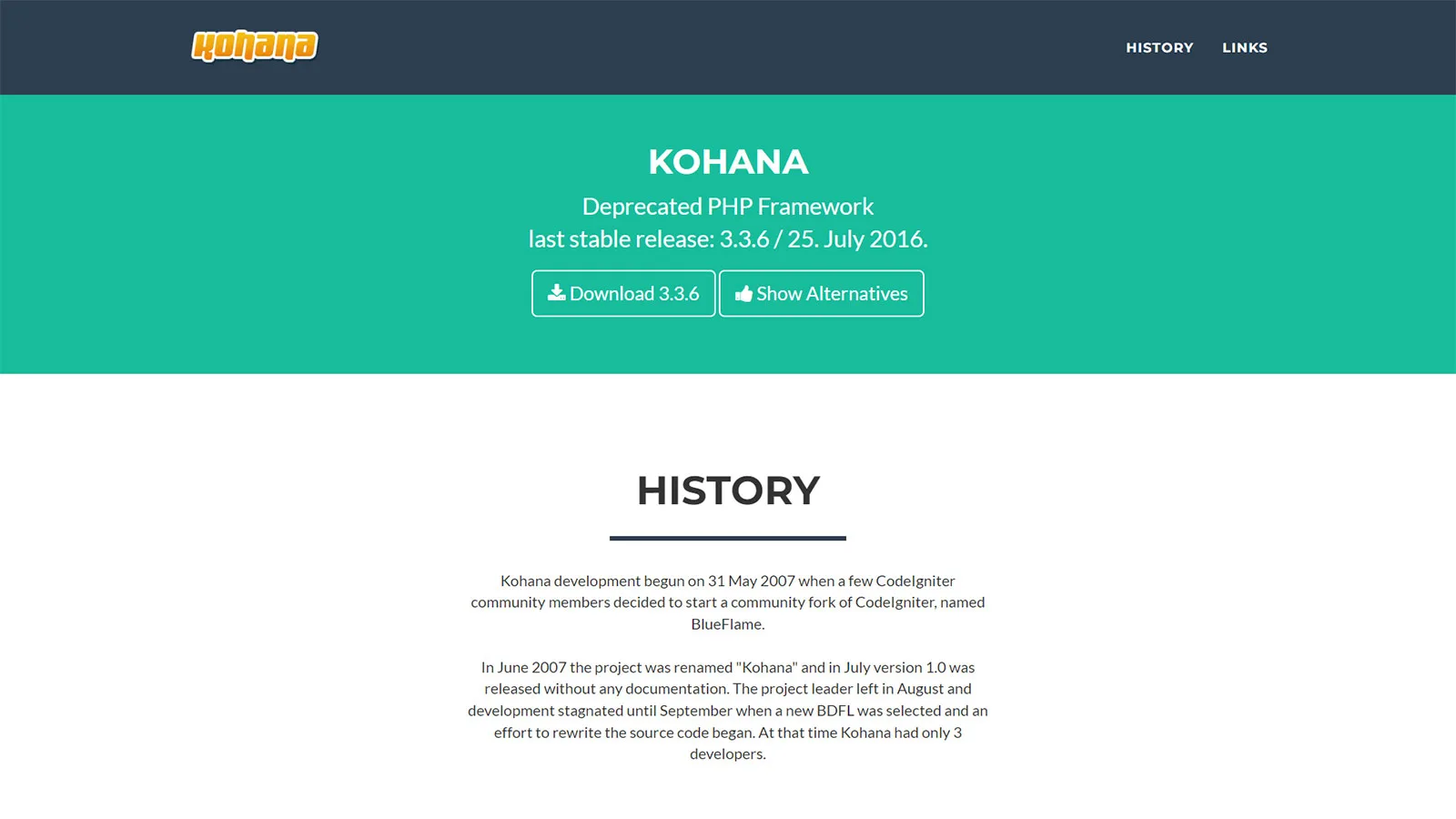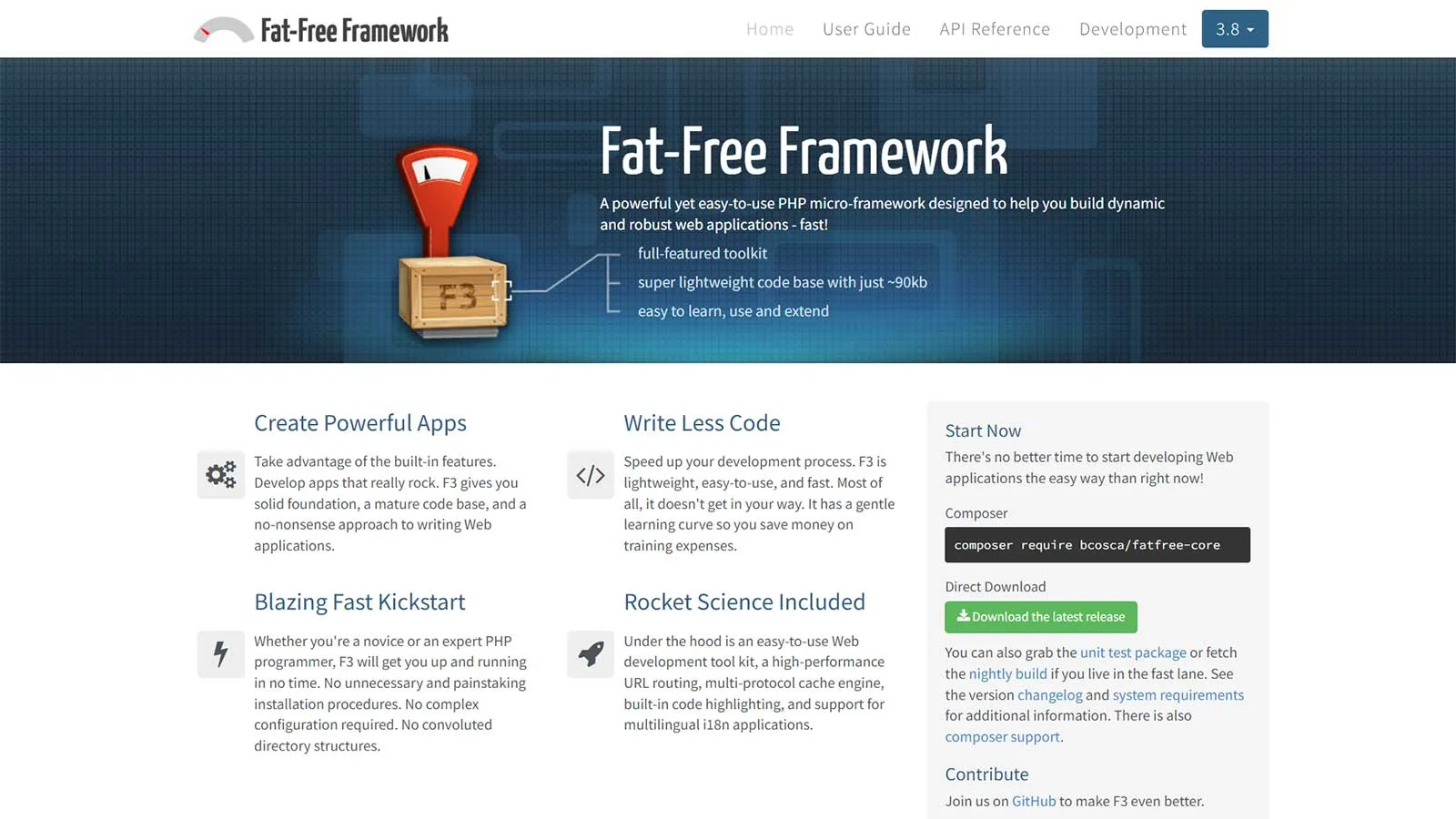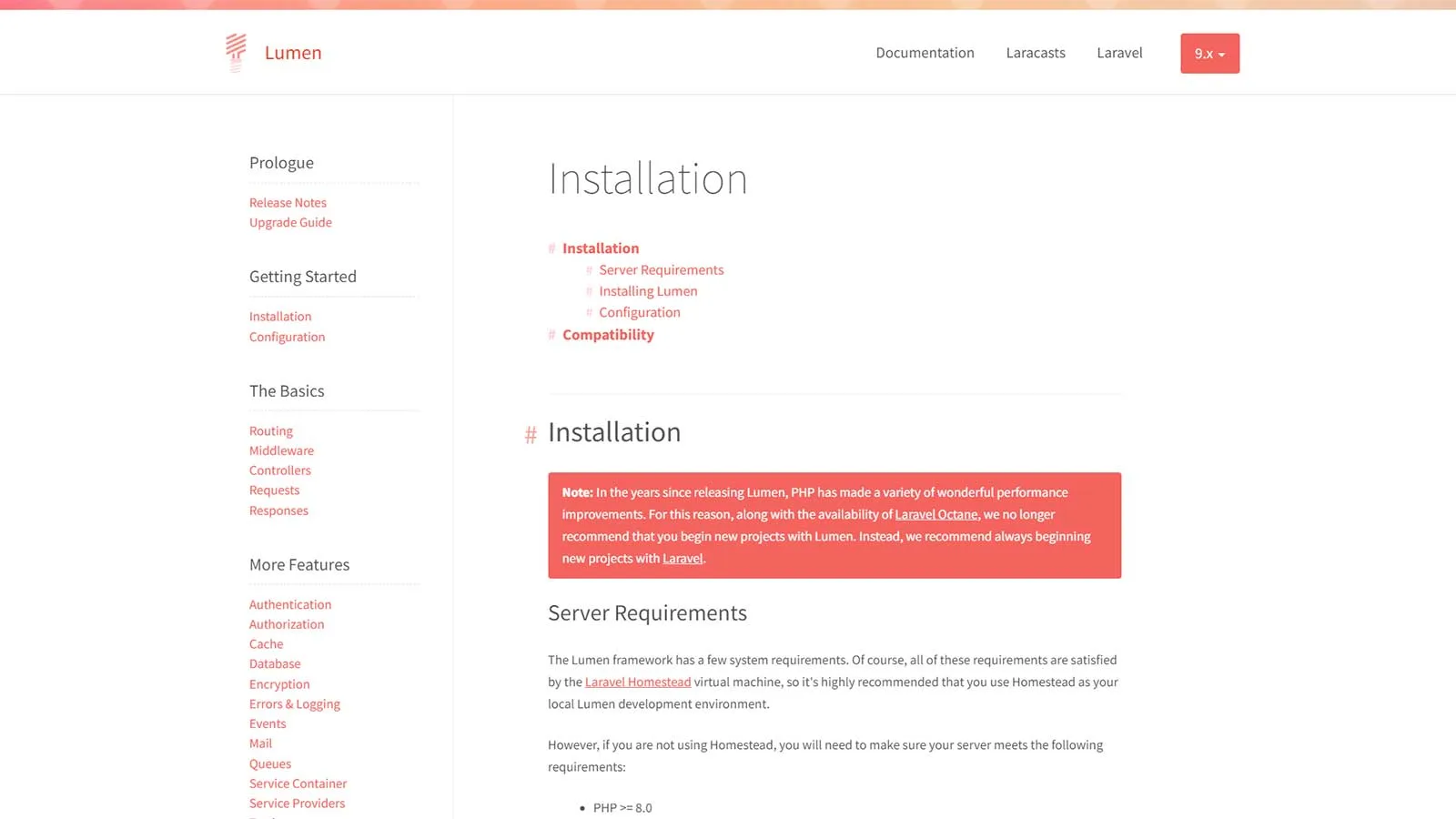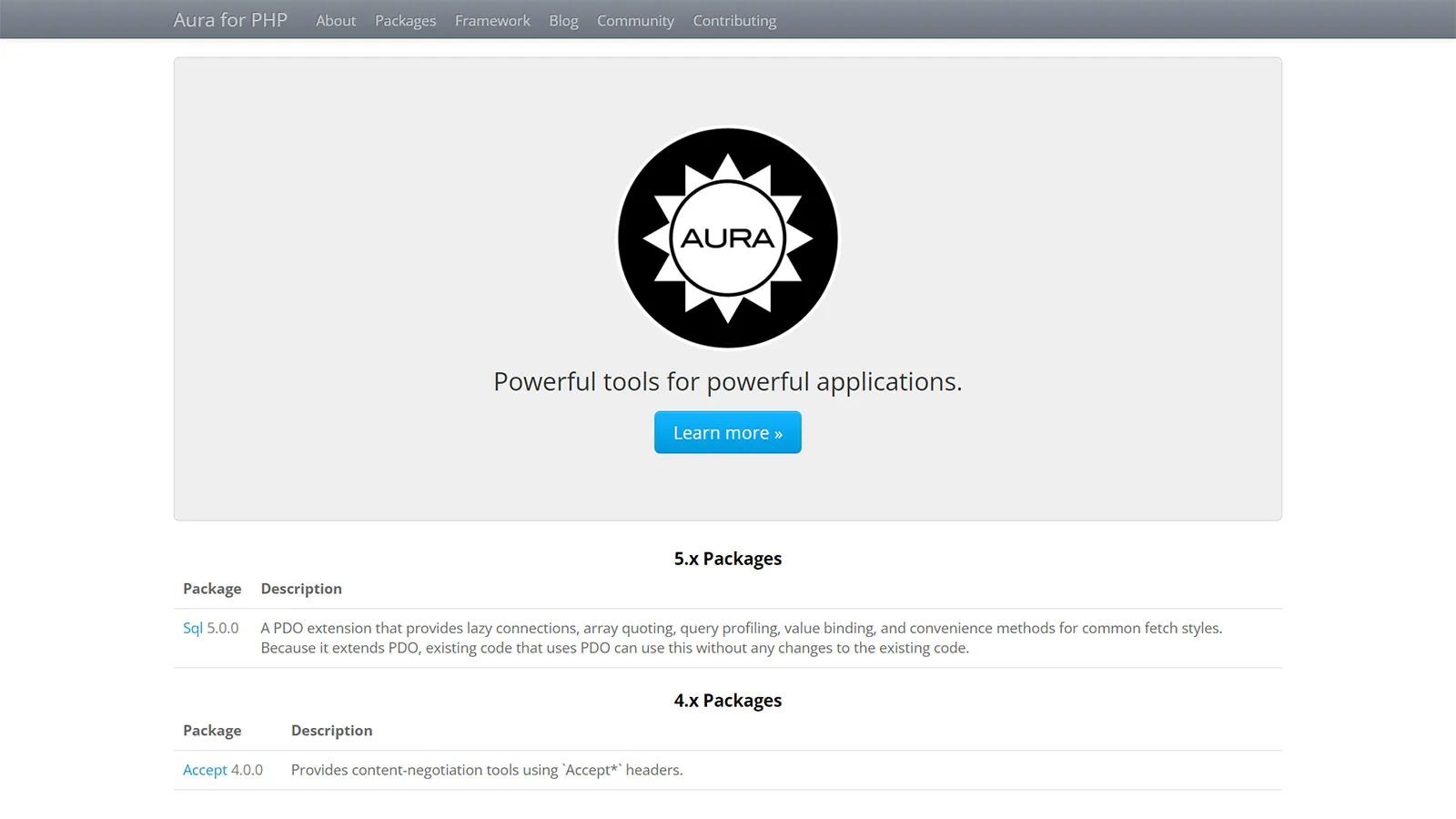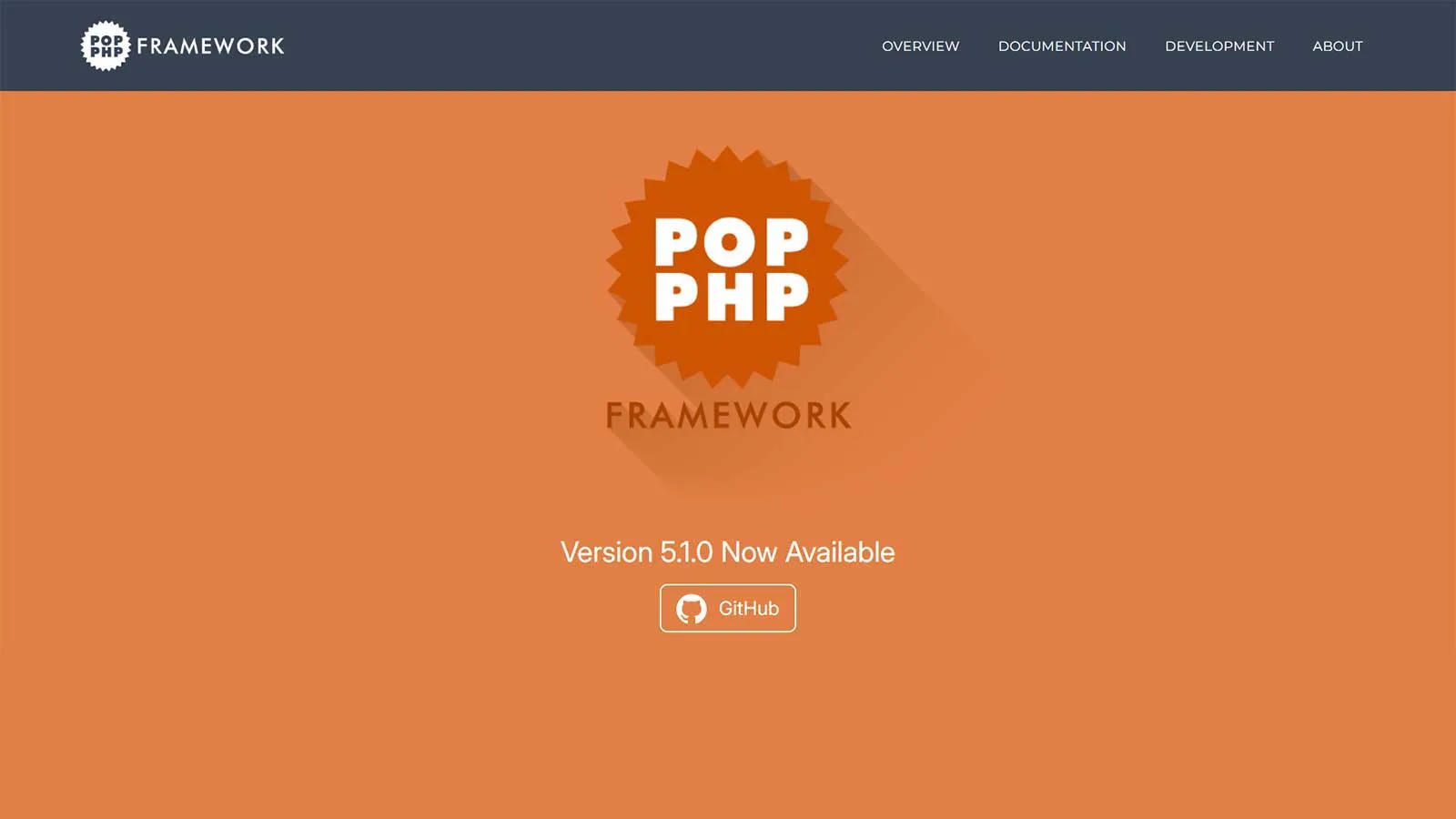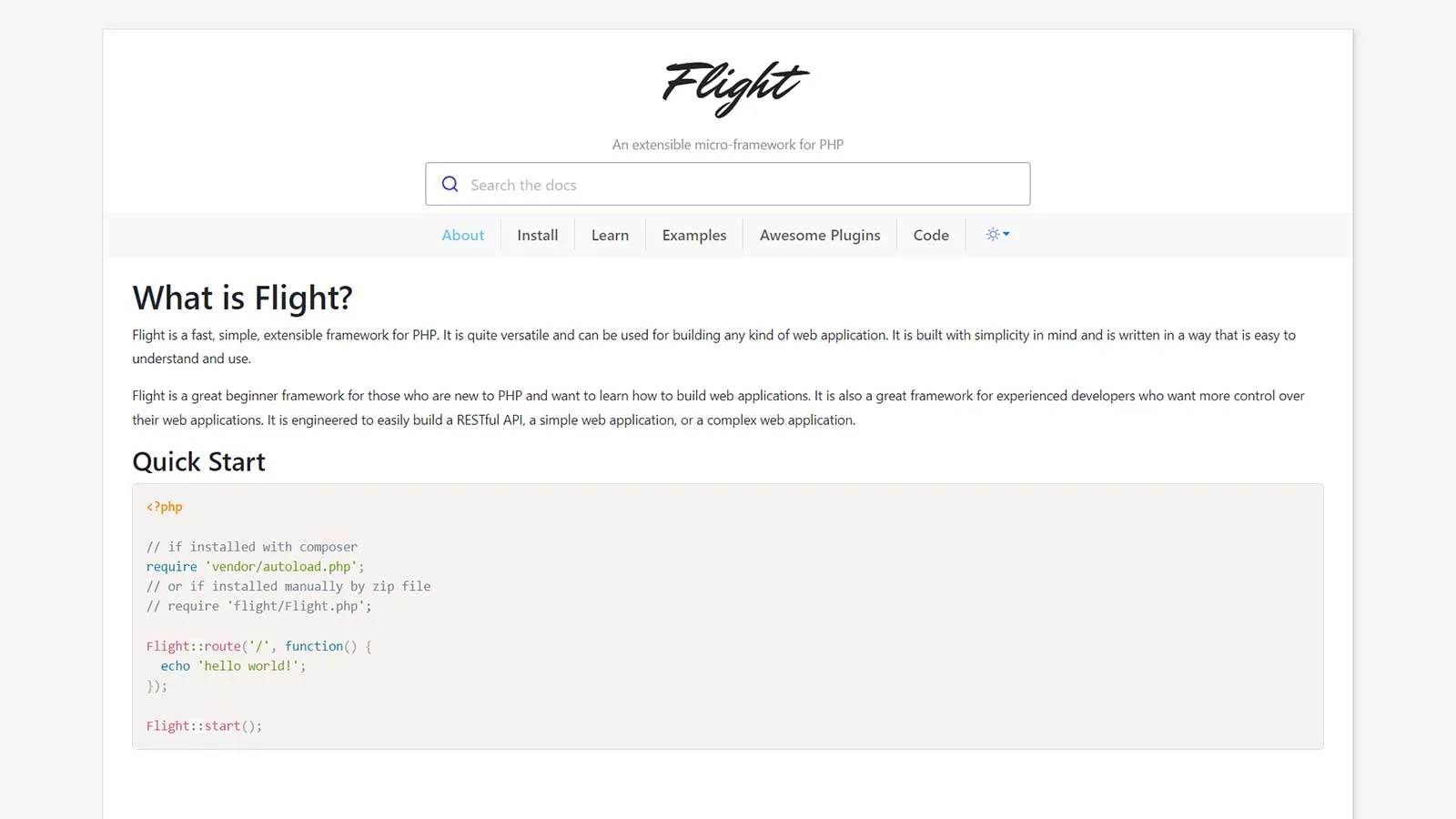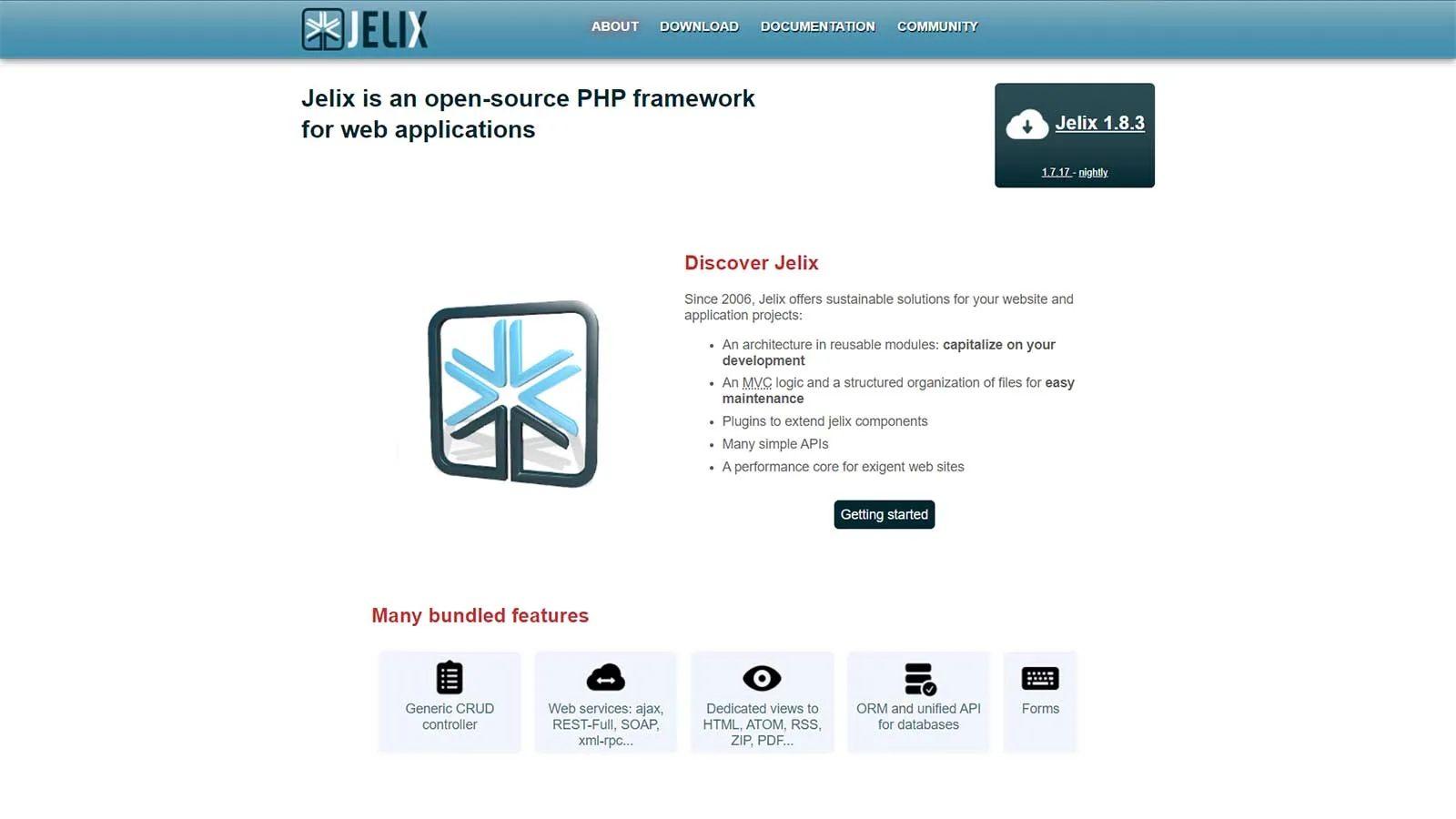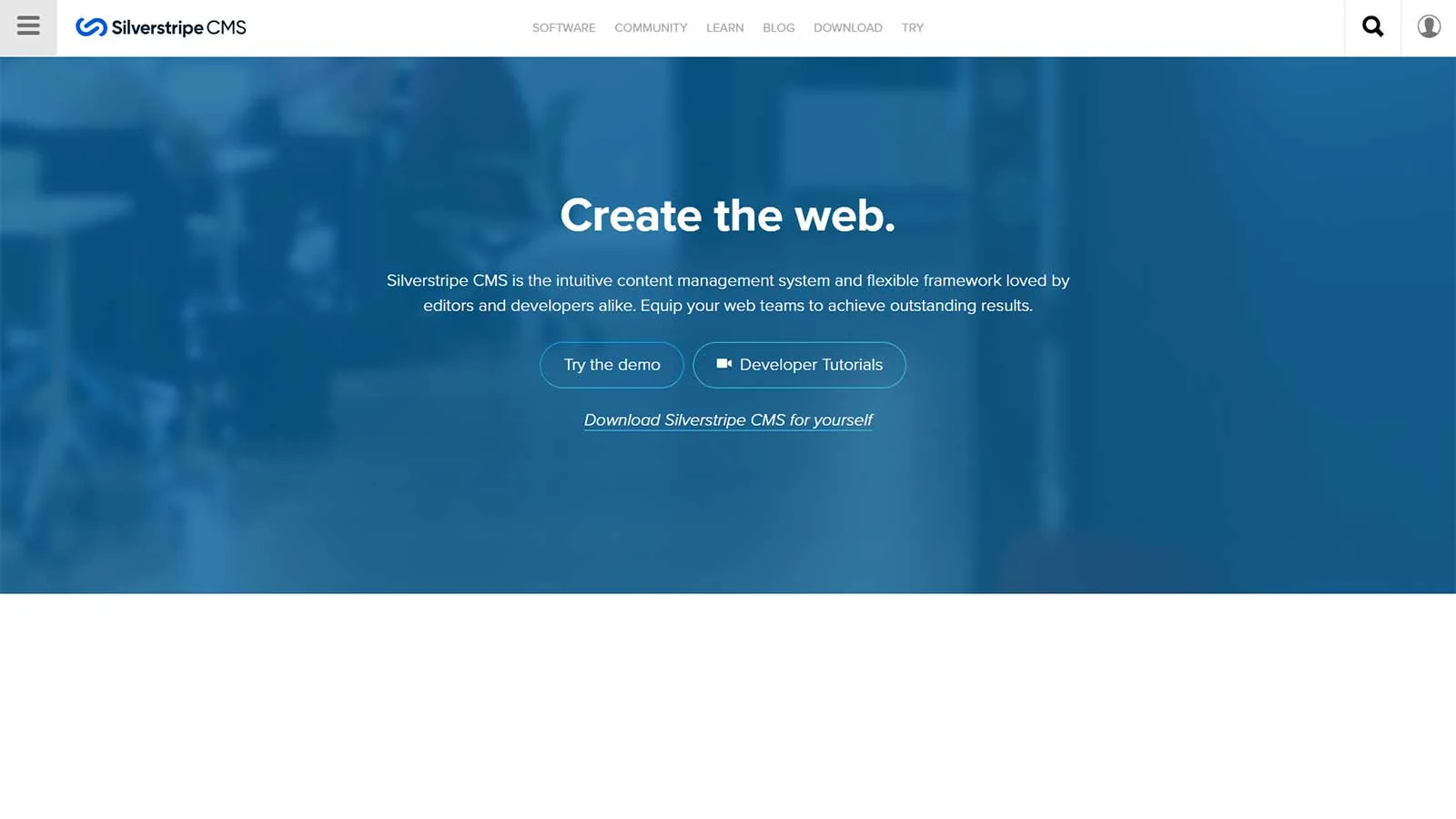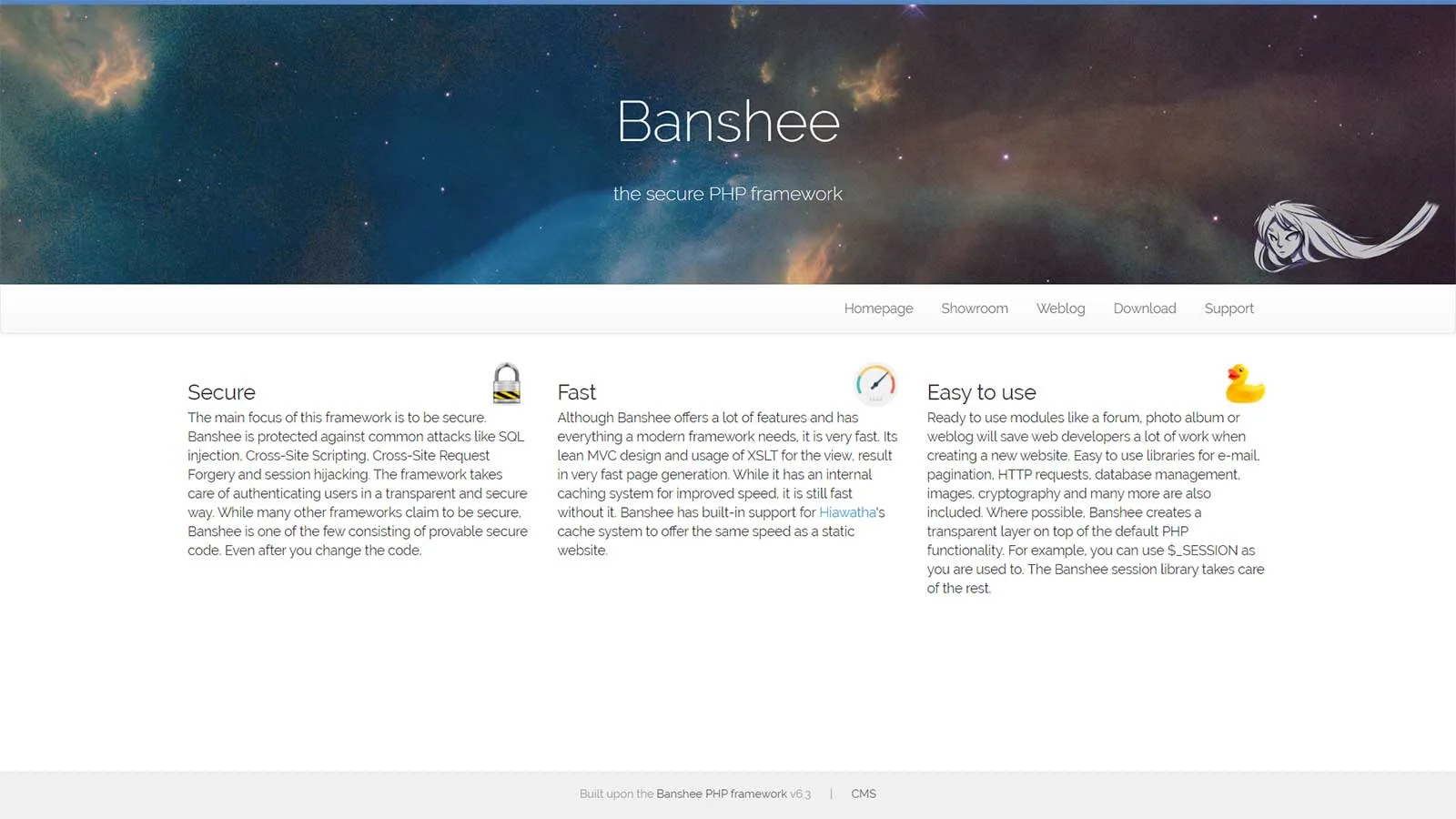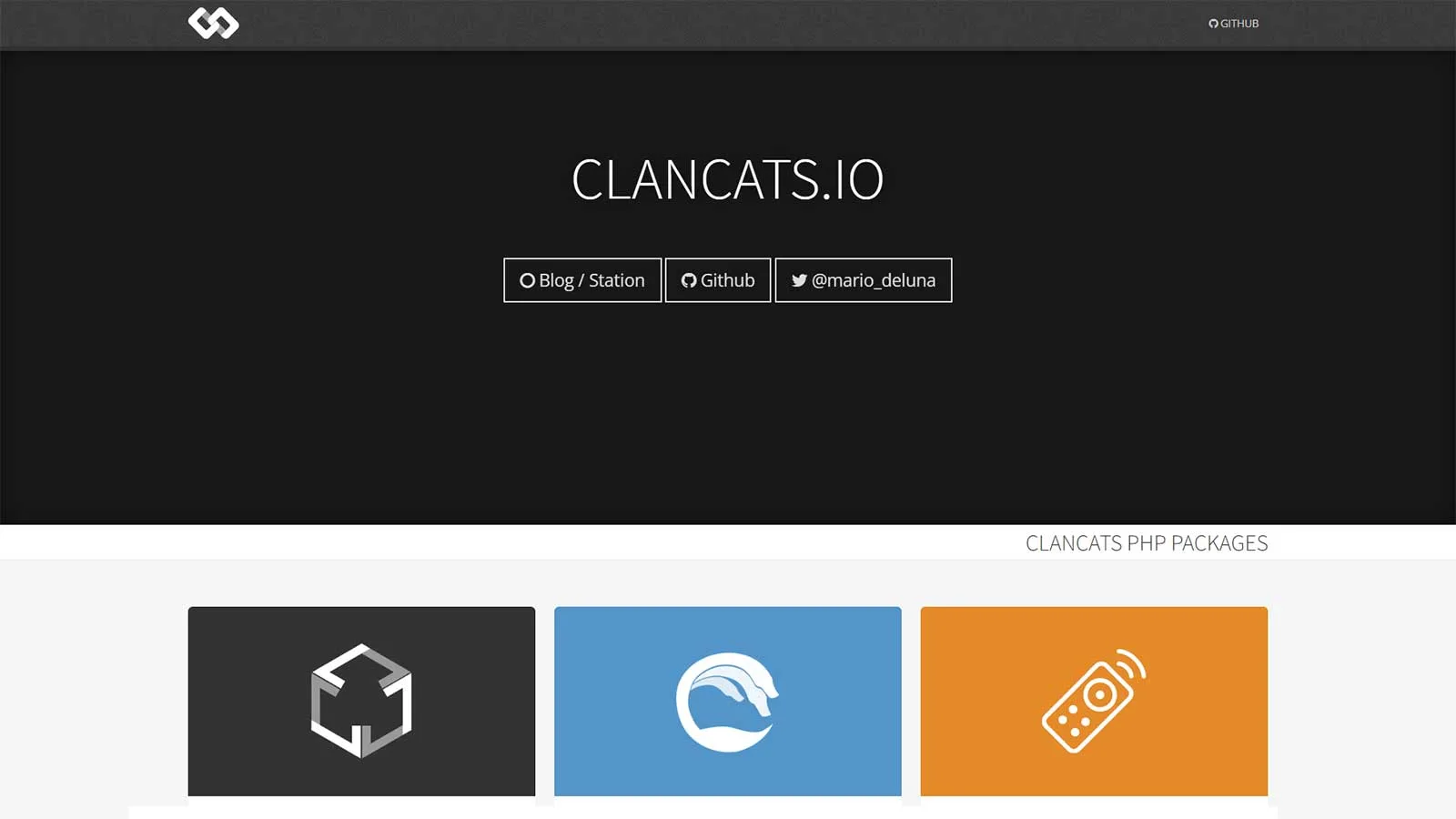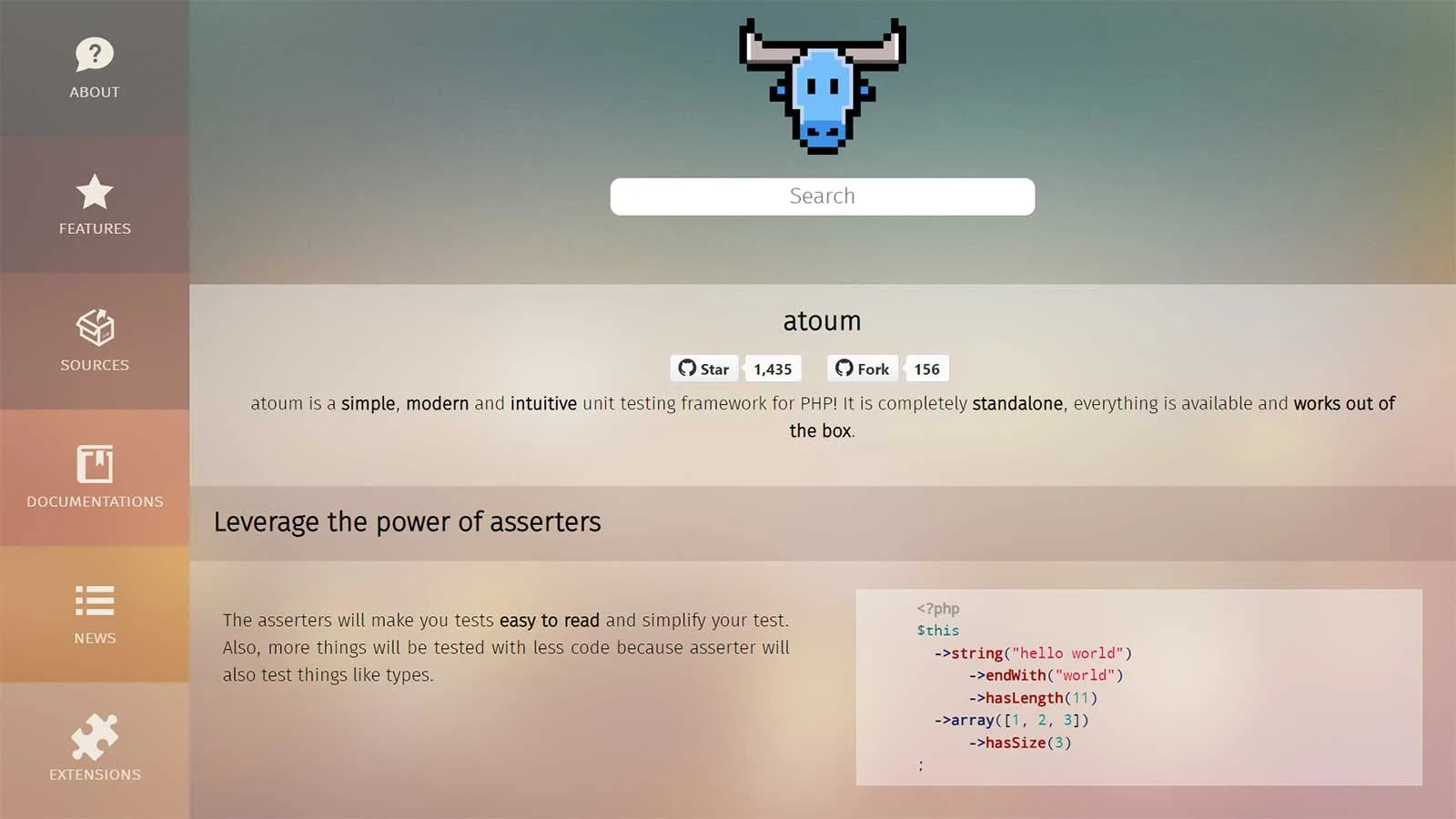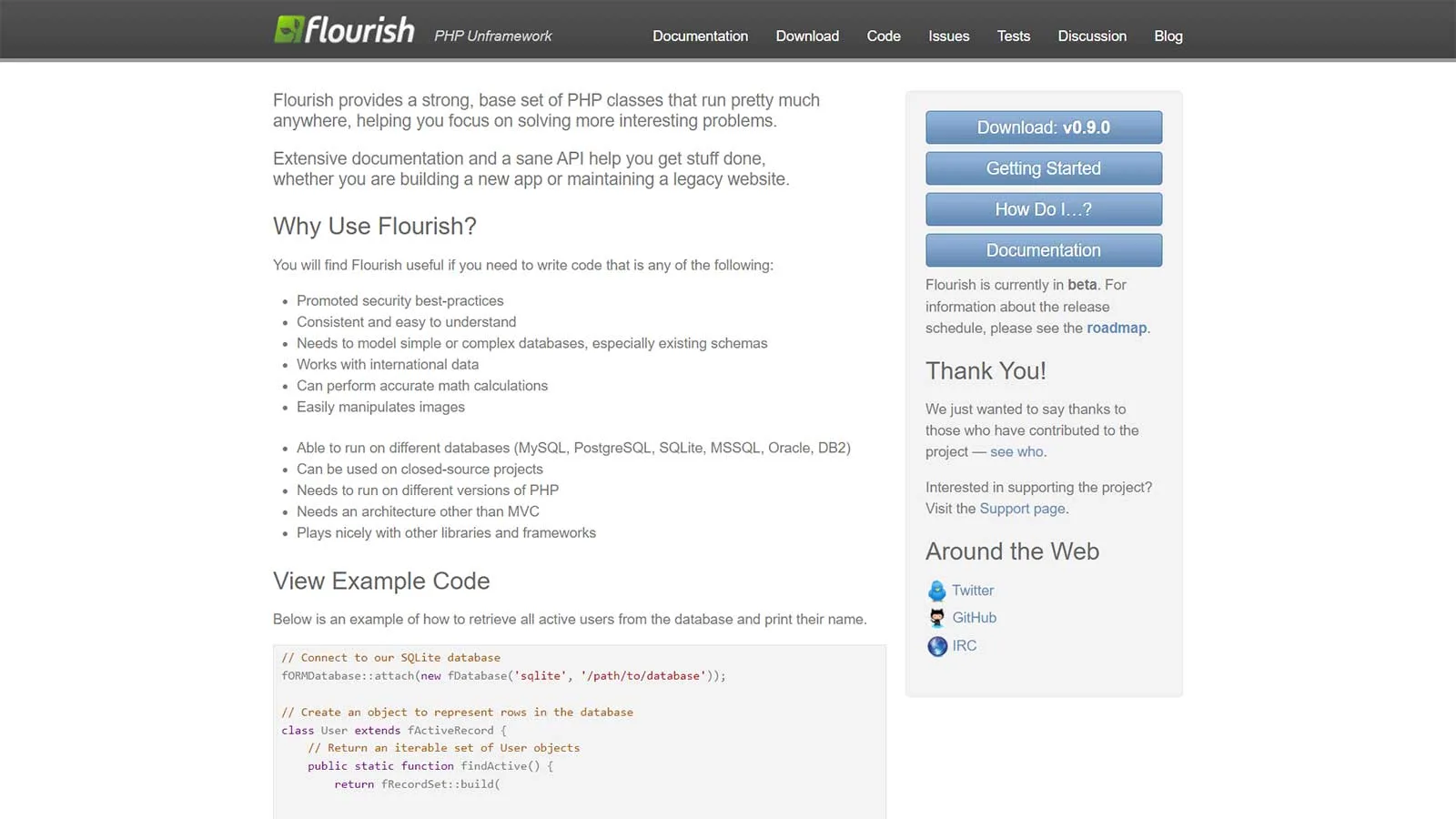40+ Best PHP Frameworks in 2024
In the dynamic web development landscape, PHP (Hypertext Preprocessor) has stood the test of time as one of the most popular server-side scripting languages. To harness the full potential of PHP and streamline the development process, developers turn to PHP frameworks.
Best Ready to Use Web Themes & Templates
Table of Content
- Codeigniter
- Symfony
- PHPUnit
- Laravel
- Phalcon
- Yii Framework
- FuelPHP
- Laminas
- Codeception
- CakePHP
- Slim
- Medoo
- Ice Framework
- Zest
- StupidlySimple
- QueryPHP
- MODX
- ElefantCMS
- UserFrosting
- RedCat
- Swoole
- PHPSpec
- CrossPHP
- Mockery
- Workerman
- Sabre Dav
- Li3
- Behat
- Joomla Framework
- Mvc5
- Nette
- Opauth
- Kohana
- Fat Free Framework
- Lumen
- Aura
- PopPHP Framework
- Flight
- Jelix
- SilverstripeCMS
- Banshee
- ClanCats IO
- Atoum
- Flourish
Bootstrap 5 Templates
Bootstrap One Page Templates, Bootstrap 5 Templates, Free Bootstrap Templates
These frameworks provide a structured and organized approach to building web applications, making development faster, more efficient, and less error-prone. In this blog post, we’ll embark on a journey to explore the fundamentals of PHP frameworks and understand their significance in modern web development.
Codeigniter
CodeIgniter is a lightweight PHP framework known for its small footprint and simplicity. It’s designed to help developers build web applications quickly and efficiently, with a focus on performance and simplicity. CodeIgniter is an open-source PHP framework designed to make web development faster and easier. It follows the MVC (Model-View-Controller) architecture pattern, providing a structured framework for building dynamic websites.
Features
- Small Footprint: CodeIgniter is praised for its minimalistic footprint. It doesn’t require a large amount of disk space or memory, making it ideal for shared hosting environments and situations where resources are limited.
- MVC Architecture: CodeIgniter follows the Model-View-Controller (MVC) architectural pattern. This separation of concerns makes the codebase easier to manage, understand, and maintain.
- Simple Configuration: Configuration in CodeIgniter is straightforward. Most of the configuration settings are located in the
configdirectory, allowing developers to quickly set up their environment. - Built-in Security Features: CodeIgniter comes with built-in security features to help developers prevent common vulnerabilities such as cross-site scripting (XSS), SQL injection, and cross-site request forgery (CSRF).
Symfony
Symfony is a high-performance PHP framework for web development that aims to accelerate the creation and maintenance of web applications. It’s known for its robust architecture, flexibility, and comprehensive feature set. It provides a set of reusable components, libraries, and tools that help developers build robust, scalable, and maintainable applications efficiently.
Features
- High Performance: Symfony is designed with performance in mind. It leverages various caching techniques, such as opcode caching, HTTP caching, and metadata caching, to optimize the performance of web applications.
- Dependency Injection: Symfony utilizes dependency injection, a design pattern that promotes loose coupling and modular design by injecting dependencies into objects rather than hardcoding them. This makes Symfony applications more flexible, testable, and maintainable.
- Command-Line Interface (CLI): Symfony includes a command-line interface (CLI) tool called Symfony Console, which allows developers to create, run, and manage console commands for tasks such as database migrations, code generation, and application maintenance.
- Doctrine ORM: Symfony integrates seamlessly with Doctrine, an object-relational mapping (ORM) library for PHP. Doctrine provides a powerful abstraction layer for database interactions, allowing developers to work with databases using object-oriented principles.
- Command-Line Interface (CLI): Symfony includes a command-line interface (CLI) tool called Symfony Console, which allows developers to create, run, and manage console commands for tasks such as database migrations, code generation, and application maintenance.
PHPUnit
PHPUnit is a programmer-oriented testing framework for PHP. It is widely used in the PHP community for writing unit tests, integration tests, and functional tests to ensure the quality and reliability of PHP applications. These frameworks adhere to a common architecture and set of principles, known as the xUnit architecture, which defines how unit tests should be organized, executed, and reported.
Features
- Unit Testing: PHPUnit is primarily designed for unit testing, which involves testing individual units or components of code in isolation. With PHPUnit, developers can write tests for classes, methods, functions, and other smaller units of code to verify that they behave as expected.
- Mock Objects: PHPUnit allows developers to create mock objects, stubs, and spies to isolate the code under test from its dependencies. Mock objects can simulate the behavior of external dependencies, making it easier to test the code in isolation and control the test environment.
- Code Coverage Analysis: PHPUnit can generate code coverage reports that show which parts of the codebase are covered by tests and which parts are not. This helps developers identify untested code and improve the overall test coverage of their applications.
- Assertions: PHPUnit provides a wide range of assertion methods that developers can use to verify the behavior of their code. These assertion methods allow developers to make assertions about conditions, values, exceptions, and more, ensuring that the code behaves correctly under different scenarios.
- Test Fixture: A test fixture is the context in which a test case operates. It includes the setup and teardown code that prepares the environment for running tests and cleans up afterward. Test fixtures ensure that tests are executed in a consistent and predictable environment, helping to isolate the code under test from external dependencies.
Laravel
Laravel is a powerful PHP framework for web artisans, known for its elegant syntax, developer-friendly features, and robust ecosystem. Created by Taylor Otwell in 2011, Laravel has gained immense popularity in the PHP community due to its simplicity, scalability, and expressive syntax.
Features
- Artisan CLI: Laravel comes with a powerful command-line interface (CLI) tool called Artisan, which provides a wide range of commands for automating common development tasks. Developers can use Artisan to generate code scaffolding, run database migrations, clear caches, and perform other tasks, enhancing productivity and workflow efficiency.
- Expressive Syntax: Laravel is renowned for its clean and expressive syntax, which makes it a joy to work with for developers of all skill levels. It provides a simple and intuitive API that allows developers to write concise and readable code.
- Eloquent ORM: Laravel includes Eloquent, an elegant and intuitive object-relational mapping (ORM) library that simplifies database interactions. Eloquent allows developers to define database models using simple PHP classes and perform CRUD (Create, Read, Update, Delete) operations on database records with ease.
- Middleware: Laravel middleware provides a flexible mechanism for filtering HTTP requests entering the application. Middleware can perform tasks like authentication, authorization, logging, and request preprocessing before passing the request to the application’s routes or controllers.
- Blade Templating Engine: Laravel comes with Blade, a powerful templating engine that allows developers to write clean and reusable HTML templates with expressive syntax. Blade templates support features like template inheritance, control structures, and plain PHP code, making it easy to create dynamic and interactive web pages.
Phalcon
Phalcon is a high-performance PHP framework designed to boost the speed and efficiency of web application development. It’s unique in that it’s implemented as a C-extension to PHP, rather than being written purely in PHP like most other frameworks. This architecture choice allows Phalcon to offer superior performance and lower resource consumption compared to traditional PHP frameworks.
Features
- Artisan CLI: Laravel comes with a powerful command-line interface (CLI) tool called Artisan, which provides a wide range of commands for automating common development tasks. Developers can use Artisan to generate code scaffolding, run database migrations, clear caches, and perform other tasks, enhancing productivity and workflow efficiency.
- Expressive Syntax: Laravel is renowned for its clean and expressive syntax, which makes it a joy to work with for developers of all skill levels. It provides a simple and intuitive API that allows developers to write concise and readable code.
- Eloquent ORM: Laravel includes Eloquent, an elegant and intuitive object-relational mapping (ORM) library that simplifies database interactions. Eloquent allows developers to define database models using simple PHP classes and perform CRUD (Create, Read, Update, Delete) operations on database records with ease.
- Middleware: Laravel middleware provides a flexible mechanism for filtering HTTP requests entering the application. Middleware can perform tasks like authentication, authorization, logging, and request preprocessing before passing the request to the application’s routes or controllers.
- Blade Templating Engine: Laravel comes with Blade, a powerful templating engine that allows developers to write clean and reusable HTML templates with expressive syntax. Blade templates support features like template inheritance, control structures, and plain PHP code, making it easy to create dynamic and interactive web pages.
Yii Framework
Yii is a high-performance PHP framework that prioritizes speed, security, and efficiency. It’s pronounced as “yee” and stands for “Yes It Is!” Yii is known for its ease of use, extensibility, and rich feature set, making it a popular choice for developing a wide range of web applications.
Features
- RESTful API Development: Yii provides built-in support for developing RESTful APIs, making it easy to expose application functionality as web services. It offers features like routing, request parsing, response formatting, and content negotiation to simplify API development. Yii also includes tools for securing APIs with authentication, rate limiting, and access control.
- Widget and Extension Library: Yii comes with a rich library of built-in widgets and extensions that extend its core functionality and provide additional features. Widgets are reusable UI components that can be easily integrated into views to add functionality such as forms, grids, and pagination. Extensions are third-party packages that enhance Yii with additional features like authentication, caching, and integration with third-party services.
- High Performance: Yii is designed for speed and efficiency, with optimized code and caching mechanisms that help minimize response times and improve overall application performance. It leverages features like lazy loading and efficient database access to ensure that applications built with Yii can handle high traffic loads with ease.
- Active Record: Yii includes an Active Record implementation that allows developers to work with database records as objects. Active Record simplifies database interactions by mapping database tables to PHP classes and providing intuitive methods for querying, inserting, updating, and deleting records. It also supports relationships between models, making it easy to work with related data.
FuelPHP
FuelPHP is a simple and flexible PHP framework designed to streamline the process of building web applications. It prioritizes ease of use, flexibility, and performance, making it an ideal choice for developers who value simplicity and efficiency.
Features
- Simplicity and Flexibility: FuelPHP aims to provide a straightforward and intuitive development experience without sacrificing flexibility. It offers a clean and concise syntax, along with powerful features that allow developers to build a wide range of web applications quickly and efficiently.
- ORM and Query Builder: FuelPHP includes an Object-Relational Mapping (ORM) layer that simplifies database interactions by abstracting away low-level SQL queries. It provides an intuitive interface for defining database models and performing CRUD (Create, Read, Update, Delete) operations on database records. Additionally, FuelPHP offers a query builder that allows developers to construct database queries using a fluent and chainable syntax.
- Form and Input Handling: FuelPHP provides features for handling form submissions and user input validation. It includes form helper functions that simplify the process of generating HTML forms and processing form data. Additionally, FuelPHP offers built-in validation rules and filters for validating user input and preventing common security vulnerabilities such as cross-site scripting (XSS) and SQL injection.
- Extensibility and Modularization: FuelPHP is designed to be highly extensible and modular, allowing developers to customize and extend its functionality as needed. It provides a modular architecture that allows developers to organize code into reusable modules and packages, making it easy to add new features or modify existing ones without affecting the core framework.
Laminas
Laminas is a collection of PHP packages that provide standalone components for building web applications, APIs, and services. It was formerly known as Zend Framework before its rebranding in 2020. Laminas offers a modular architecture, allowing developers to use individual components as needed, or combine them to build robust and feature-rich applications. Two key components of Laminas are Mezzio and API Tools, which cater to different aspects of web development.
Features
- Mezzio (formerly Expressive): Mezzio is a lightweight and flexible middleware-centric PHP framework for building web applications and APIs. It’s designed to be minimalist and unopinionated, allowing developers to use the components and tools of their choice. Mezzio leverages the concept of middleware, which allows developers to intercept and process HTTP requests and responses in a modular and composable way. This makes it easy to add functionality such as routing, error handling, authentication, and content negotiation to applications.
- Laminas Components: Laminas offers a wide range of PHP components that cover various aspects of web development, including database access, form handling, authentication, caching, and more. These components are designed to be decoupled and interoperable, allowing developers to use them independently or integrate them seamlessly into existing projects.
- Interoperability: Laminas components are designed to be interoperable with other PHP frameworks and libraries, allowing developers to integrate them seamlessly into existing projects. Mezzio and API Tools are built on top of Laminas components, ensuring compatibility and interoperability with the wider PHP ecosystem.
- API Tools: API Tools is a set of tools and components for building and documenting RESTful APIs. It provides features such as automatic API documentation generation, input validation, content negotiation, error handling, and versioning. API Tools simplifies the process of creating robust and feature-rich APIs, allowing developers to focus on defining endpoints and business logic without worrying about boilerplate code.
- Interoperability: Laminas components are designed to be interoperable with other PHP frameworks and libraries, allowing developers to integrate them seamlessly into existing projects. Mezzio and API Tools are built on top of Laminas components, ensuring compatibility and interoperability with the wider PHP ecosystem.
Codeception
Codeception is a comprehensive testing framework for PHP applications, designed to simplify and streamline the process of writing and executing tests. It’s particularly well-suited for testing PHP web applications, including frameworks like Laravel, Symfony, Yii, and others.
Features
- Human-Readable Syntax: Codeception uses a natural language syntax inspired by BDD principles, making tests easier to read and understand. Tests are written in a descriptive manner, which helps improve collaboration between developers, testers, and stakeholders.
- Support for Web Testing: Codeception includes powerful features for testing web applications, such as browser automation using Selenium or WebDriver, form submission, page navigation, and element assertion.
- Analyzing Results: Analyze the test results to identify any failures or issues in your application. Codeception provides detailed reports with information about failed tests, including stack traces and error messages.
- Integration with PHP Frameworks: Codeception seamlessly integrates with popular PHP frameworks like Laravel, Symfony, Yii, and Zend Framework, allowing developers to write tests specific to their framework’s conventions and features.
Medoo
Medoo is a lightweight PHP database framework designed to streamline database operations and accelerate development by providing a simple yet powerful interface for interacting with databases. It abstracts away much of the complexity of database interactions, making it easy for developers to perform common tasks with minimal code.
Features
- Performance: Medoo is designed for performance and efficiency, with a lightweight footprint and minimal overhead. It is optimized for speed and scalability, making it suitable for high-traffic applications and performance-sensitive use cases.
- Simplicity: Medoo follows a minimalist design philosophy, providing a simple and intuitive API for interacting with databases. It abstracts away much of the complexity of database operations, allowing developers to perform common tasks with just a few lines of code.
- Automatic SQL Generation: Medoo automatically generates SQL queries based on method calls, reducing the need for manual query construction. Developers can perform complex database operations using simple method calls, making code more readable and maintainable.
- Database Operations: Use Medoo’s API to perform common database operations, such as selecting data, inserting records, updating records, and deleting records. Medoo provides a simple and consistent interface for executing SQL queries and fetching results.
CakePHP
CakePHP is a powerful open-source PHP framework designed to help developers build web applications rapidly while maintaining a solid foundation for scalability and maintainability.
Features
- CRUD Scaffolding: CakePHP provides built-in scaffolding tools that allow developers to generate basic CRUD (Create, Read, Update, Delete) functionality for database tables with minimal effort. This accelerates the development process for creating database-backed applications.
- Conventions over Configuration: CakePHP follows the principle of “convention over configuration,” which means that developers can build applications faster by following naming conventions and standard practices. This reduces the need for manual configuration and boilerplate code.
- Built-in Security Features: CakePHP includes built-in security features to help developers protect their applications against common security threats, such as SQL injection, cross-site scripting (XSS), and cross-site request forgery (CSRF). These features include input validation, data sanitization, and CSRF protection.
- Creating Controllers: Create controller classes in the
src/Controllerdirectory to handle incoming HTTP requests and generate responses. Define controller actions to implement the application’s business logic.
Ice Framework
IcePHP is a lightweight and open-source PHP framework designed to simplify web application development by providing a simple yet powerful set of tools and features. It focuses on speed, simplicity, and flexibility, allowing developers to build web applications quickly and efficiently.
Features
- Speed: IcePHP is optimized for performance and efficiency, with a lightweight footprint and minimal overhead. It is designed to be fast and responsive, making it suitable for high-traffic websites and performance-sensitive applications.
- Routing: IcePHP includes a powerful routing system that allows developers to define URL routes for mapping incoming requests to controller actions. Routes can be defined using simple patterns and callbacks, making it easy to create clean and expressive URLs.
- Simplicity: IcePHP follows a minimalist design philosophy, providing a simple and intuitive API for building web applications. It abstracts away much of the complexity of web development, allowing developers to focus on writing clean and maintainable code.
- Documentation: IcePHP comes with comprehensive documentation that covers all aspects of the framework, including installation, configuration, usage, and advanced topics. The documentation includes code examples, tutorials, and reference guides to help developers get started with IcePHP quickly and easily.
Zest
Zest is a lightweight PHP framework designed to offer developers a minimalist yet powerful toolset for building web applications. It prioritizes simplicity, performance, and minimal dependencies, providing developers with the essentials needed to create robust applications without unnecessary overhead.
Features
- Lightweight and Minimal Dependencies: Zest is designed to be lightweight and has minimal dependencies, keeping the framework’s footprint small and ensuring optimal performance. It avoids unnecessary features and components, allowing developers to focus on the essentials needed for their projects.
- Views and Templates: Create view templates using Zest’s built-in template engine. Define layout files, partials, and helper functions to generate HTML output for your application’s pages.
- Simplicity: Zest follows a minimalist design philosophy, providing a simple and intuitive API for building web applications. It abstracts away much of the complexity of web development, making it easy for developers to get started and write clean, maintainable code.
- Database Access: Zest includes a lightweight database abstraction layer that simplifies database interactions. It supports various database drivers and provides a simple API for executing SQL queries, fetching results, and managing transactions.
Slim
Slim is a lightweight PHP micro-framework that enables developers to build simple yet powerful web applications and APIs quickly and efficiently. It provides the essential features needed for web development while maintaining minimalism and flexibility.
Features
- Minimalistic Design: Slim follows a minimalist design philosophy, providing only the essential features needed for web development. This lightweight approach makes Slim easy to learn and use, especially for developers who prefer simplicity and flexibility.
- Middleware: Slim supports middleware, which are small, reusable components that can modify the request and response objects as they pass through the application’s middleware stack. Middleware can be used for tasks such as authentication, logging, error handling, and more.
- HTTP Caching: Slim provides built-in support for HTTP caching, allowing developers to cache responses at the server or client side to improve performance and reduce server load. Slim supports various caching strategies, including time-based expiration, entity tags (ETags), and conditional requests.
- Dependency Injection: Use Slim’s dependency injection container (DIC) to manage dependencies and organize your application code. Register dependencies with the DIC using the
containerproperty.
StupidlySimple
StupidlySimple is a lightweight and intuitive PHP framework designed for rapid web development. As its name suggests, it aims to simplify the development process, allowing developers to build robust web applications with minimal complexity and hassle.
Features
- Modular Architecture: StupidlySimple encourages modular development by providing a simple and flexible structure for organizing code. This allows developers to break down their applications into smaller, manageable components, promoting code reusability and maintainability.
- Minimal Configuration: StupidlySimple adopts a convention-over-configuration approach, reducing the need for extensive configuration files. This allows developers to focus more on writing code and less on boilerplate setup.
- Extensibility: StupidlySimple is designed to be extensible, allowing developers to easily integrate third-party libraries and components into their projects. This flexibility enables developers to leverage existing tools and resources, saving time and effort in the development process.
- Easy Routing: Routing in StupidlySimple is straightforward and easy to understand. Developers can define routes using simple patterns, making it effortless to map URLs to specific controllers and actions.
QueryPHP
QueryPHP is a progressive PHP framework designed to empower developers to build modern web applications with ease. It prioritizes simplicity, performance, and flexibility, allowing developers to gradually incorporate its features as needed.
Features
- Progressive Design: QueryPHP follows a progressive design philosophy, allowing developers to adopt its features gradually as their project requirements evolve. It provides a lightweight foundation for building web applications and allows developers to add additional functionality as needed.
- Modern PHP Standards: QueryPHP embraces modern PHP standards and best practices, including PSR-4 autoloading, dependency injection, and containerization. It encourages the use of object-oriented programming (OOP) principles and design patterns to write clean, maintainable code.
- Dependency Injection Container (DIC): QueryPHP includes a dependency injection container (DIC) that allows developers to manage dependencies and organize their code more efficiently. The DIC provides automatic dependency resolution and supports constructor injection, method injection, and property injection.
- Routing and Middleware: QueryPHP features a flexible routing system that allows developers to define URL routes for handling incoming HTTP requests. It also supports middleware, which are small, reusable components that can modify the request and response objects as they pass through the application’s middleware stack.
MODX
MODX is a powerful and flexible open-source content management system (CMS) that empowers users to create and manage dynamic websites and web applications. With its highly customizable nature and intuitive interface, MODX is favored by developers and content creators alike. At its core, MODX is built on PHP, making it compatible with a wide range of web hosting environments. However, when paired with a managed hosting platform specifically optimized for MODX, users can achieve unmatched speed and performance for their websites.
Features
- Automatic Updates and Maintenance: We take care of routine updates and maintenance tasks, ensuring that your MODX installation is always up to date and secure without you needing to lift a finger.
- Scalability: Our hosting platform is designed to scale with your website’s needs, accommodating fluctuations in traffic and ensuring consistent performance even during peak usage periods.
- Optimized Server Configuration: We configure our servers specifically to enhance MODX performance, ensuring fast page load times and smooth user experiences.
- Scalability: Our hosting platform is designed to scale with your website’s needs, accommodating fluctuations in traffic and ensuring consistent performance even during peak usage periods.
ElefantCMS
Elefant CMS is a refreshingly simple PHP framework tailored specifically for content management system (CMS) needs. It offers developers and content creators alike a straightforward yet powerful platform for building and managing websites and web applications.
Features
- Flexible Content Management: Elefant CMS offers flexible content management capabilities, allowing users to create and organize content in a way that suits their needs. It supports various content types, including pages, blog posts, news articles, and more, making it suitable for a wide range of websites and applications.
- Simplicity: Elefant CMS prides itself on its simplicity. It features an intuitive user interface and a clean, minimalistic design that makes it easy for users to navigate and manage content without feeling overwhelmed.
- Built-in Tools and Features: Elefant CMS includes a variety of built-in tools and features to streamline website management and development. These include SEO optimization tools, built-in analytics, social media integration, and more, helping users to maximize the effectiveness and visibility of their websites.
- Developer-Friendly: For developers, Elefant CMS offers a simple and extensible architecture that makes it easy to customize and extend functionality. It provides a range of developer tools, including APIs, plugins, and hooks, allowing developers to add new features and integrate third-party services with ease.
- Active Community and Support: Elefant CMS has an active community of developers and users who contribute to its development, provide support, and share resources such as plugins, themes, and tutorials. This vibrant community ensures that users have access to the help and resources they need to succeed with Elefant CMS.
UserFrosting
USERFROSTING is a modern PHP framework designed specifically for user management in web applications. It provides developers with a comprehensive set of tools and features to create secure, scalable, and user-friendly applications with ease.
Features
- Role-Based Access Control (RBAC): With USERFROSTING, developers can define roles and permissions for users, enabling fine-grained access control to different parts of the application based on user roles.
- Modern User Interface: USERFROSTING comes with a modern and responsive user interface, featuring a clean and intuitive design that is optimized for usability and accessibility.
- User Authentication and Authorization: USERFROSTING comes with built-in user authentication and authorization systems, allowing developers to easily implement user registration, login, password reset, and access control features in their applications.
- Secure Password Storage: USERFROSTING utilizes modern cryptographic techniques to securely hash and store user passwords, protecting them from unauthorized access in the event of a data breach.
- Account Management: USERFROSTING provides features for users to manage their accounts, including updating their profile information, changing passwords, and managing email notifications.
RedCat
RedCat PHP is a lightweight and agile PHP framework designed to streamline web development by emphasizing simplicity, flexibility, and speed. With its minimalistic approach and intuitive architecture, RedCat PHP empowers developers to create dynamic web applications with ease.
Features
- Agility: RedCat PHP is designed for agility, enabling rapid development and iteration of web applications. Its lightweight nature and minimal overhead facilitate quick prototyping and experimentation, allowing developers to iterate and refine their ideas efficiently.
- Simplicity: RedCat PHP embraces simplicity in its design and implementation, prioritizing ease of use and straightforwardness. This makes it an excellent choice for developers who prefer a minimalistic framework without unnecessary complexity.
- Template Engine: RedCat PHP comes with a built-in template engine that simplifies the process of generating dynamic HTML content. Developers can use familiar HTML syntax along with template tags to insert dynamic data into their views, making it easy to build dynamic and interactive web pages.
- Routing: RedCat PHP provides a simple yet powerful routing system that enables developers to define URL patterns and map them to specific controllers and actions. This allows for clean and intuitive URL structures and facilitates the implementation of RESTful APIs.
Swoole
Swoole is an innovative high-performance network framework for PHP, designed to facilitate the development of asynchronous, concurrent, and high-throughput applications. Unlike traditional PHP frameworks that rely on the synchronous execution model, Swoole leverages event-driven architecture and non-blocking I/O operations to achieve superior performance and scalability.
Features
- Programmatic PHP Framework: Swoole can be thought of as a programmatic PHP framework because it provides developers with a powerful set of APIs and tools for building networked applications directly in PHP code. Rather than relying on external web servers like Apache or Nginx, Swoole allows developers to create standalone PHP servers.
- High Performance: At the heart of Swoole’s appeal is its unparalleled performance. By utilizing non-blocking I/O and asynchronous programming techniques, Swoole can handle a large number of concurrent connections and perform I/O operations efficiently without blocking the execution of other tasks.
- Event-Driven Architecture: Swoole is built around an event-driven architecture, which enables it to handle large numbers of connections with minimal overhead and resource consumption.
- Production-Ready: Swoole is battle-tested and widely used in production environments by companies of all sizes, demonstrating its stability, reliability, and scalability.
- Coroutine Support: Swoole provides built-in support for coroutines, allowing developers to write asynchronous code in a synchronous style, which simplifies complex concurrency patterns and improves code readability.
PHPSpec
PhpSpec is a robust PHP testing and specification framework that promotes the practice of “Design by Specification.” It encourages developers to define the behavior of their code through clear specifications before writing implementation code. By focusing on specifying desired behaviors upfront, PhpSpec helps developers create well-designed, maintainable, and testable codebases.
Features
- Mocks and Stubs: PhpSpec provides built-in support for creating mocks and stubs, allowing developers to isolate units of code under test and specify interactions with dependencies.
- Design by Specification: At the core of PhpSpec is the concept of Design by Specification. Rather than starting with implementation details, developers using PhpSpec begin by defining the expected behavior of their code through specifications.
- Behavior: PhpSpec follows the principles of Behavior-Driven Development (BDD), which emphasizes collaboration between developers, testers, and stakeholders to ensure that software meets desired behavior and business requirements. With PhpSpec, developers write specifications in a human-readable.
- Red-Green-Refactor Workflow: PhpSpec follows the Red-Green-Refactor workflow commonly associated with Test-Driven Development (TDD). Developers start by writing failing specifications (Red), implement code to make the specifications pass (Green), and then refactor the code to improve its design while keeping the specifications passing.
CrossPHP
CrossPHP is an innovative PHP framework designed specifically for engineering applications, offering a robust and efficient environment for developing web-based engineering solutions. This introduction will provide an overview of CrossPHP’s features, benefits, and targeted use cases.
Features
- Performance Optimization: Through features like caching mechanisms, lazy loading, and optimized routing, CrossPHP helps developers achieve high performance in their applications.
- RESTful API Support: It offers native support for building RESTful APIs, making it easier to create interoperable and scalable web services for engineering applications.
- Reliability: With a strong focus on code quality and security, CrossPHP provides a reliable foundation for building mission-critical engineering applications.
- Scalability: Whether it’s a small-scale engineering tool or a large enterprise-grade application, CrossPHP’s modular architecture and performance optimizations ensure scalability to meet evolving requirements.
- RESTful API Support: It offers native support for building RESTful APIs, making it easier to create interoperable and scalable web services for engineering applications.
Mockery
MockeryPHP is a powerful PHP testing framework renowned for its support for magic methods, spies, and an alternative syntax for shouldReceive(). It provides developers with robust tools for creating mock objects and performing unit tests with ease.
Features
- Method Expectations: Developers can specify expectations for method invocations on mock objects using a variety of flexible syntaxes, including the alternative
shouldReceive()syntax. - Comprehensive Documentation: MockeryPHP offers comprehensive documentation and a rich set of examples, empowering developers to quickly get started with writing effective unit tests.
- Magic Methods Support: One of the standout features of MockeryPHP is its comprehensive support for magic methods. Magic methods, such as
__get,__set, and__call, allow objects to dynamically intercept property accesses and method calls. With MockeryPHP, developers can create mock objects that emulate these magic methods, enabling more realistic and flexible testing scenarios. - Spies: MockeryPHP introduces the concept of spies, which are special types of mock objects that allow developers to observe method invocations on real objects while still providing the ability to mock specific method behaviors.
- Alternative: MockeryPHP offers an alternative syntax for defining expected method invocations on mock objects using the
shouldReceive()method. This syntax provides a more expressive and readable way to specify method expectations compared to traditional mock object frameworks.
Workerman
Workerman is a powerful PHP framework designed for building high-performance, real-time applications such as chat servers, game servers, and streaming servers. Unlike traditional PHP frameworks that rely on the request-response cycle, Workerman utilizes non-blocking I/O and event-driven architecture to achieve exceptional scalability and efficiency.
Features
- Real-Time Applications: Workerman is particularly well-suited for real-time applications that require low-latency communication and high concurrency. It enables developers to create WebSocket servers, TCP/UDP servers, and other networked applications.
- Cross-Platform Compatibility: Workerman is compatible with a variety of operating systems, including Linux, macOS, and Windows, making it suitable for deployment in diverse environments.
- Event-Driven Architecture: Workerman follows an event-driven architecture, which allows it to handle I/O operations asynchronously and respond to events in a non-blocking manner. This architecture maximizes resource utilization and enables Workerman to achieve exceptional scalability and performance.
- Production-Ready: Workerman is battle-tested and widely used in production environments by companies of all sizes, demonstrating its stability, reliability, and scalability.
Sabre Dav
SabreDAV is a robust PHP framework for building WebDAV servers, designed to provide extensive sharing and delegation features. It allows developers to implement standards-compliant WebDAV servers quickly and efficiently, enabling seamless integration with various clients and applications that support the WebDAV protocol.
Features
- Extensive Sharing: one of the standout features of SabreDAV is its comprehensive support for sharing and delegation. Developers can implement advanced sharing scenarios, such as sharing calendars, contacts, files, and other resources with specific users or groups.
- WebDAV Compliance: SabreDAV adheres to the WebDAV (Web Distributed Authoring and Versioning) protocol, which extends the HTTP protocol to support collaborative editing and management of files on web servers. By implementing WebDAV standards, SabreDAV ensures compatibility with a wide range of WebDAV clients and applications.
- CalDAV and CardDAV Support: SabreDAV includes support for CalDAV (Calendar Distributed Authoring and Versioning) and CardDAV (Card Distributed Authoring and Versioning), allowing developers to build standards-compliant calendar and contact servers.
- Cross-Platform Compatibility: SabreDAV is compatible with a wide range of operating systems and web servers, including Linux, Windows, Apache, Nginx, and others, making it suitable for deployment in diverse environments.
Li3
Li3PHP is a cutting-edge PHP framework renowned for its Rapid Application Development (RAD) capabilities, exceptional speed, and unparalleled flexibility. Designed with modern web development needs in mind, Li3PHP empowers developers to create robust, scalable web applications efficiently.
Features
- RAD: Li3PHP shines in the realm of Rapid Application Development, enabling developers to swiftly prototype and deploy web applications with ease. Its intuitive syntax, powerful features, and built-in tools streamline the development process, allowing teams to iterate quickly and deliver high-quality solutions in record time.
- Speed: Performance is a top priority for Li3PHP. Leveraging advanced caching mechanisms, optimized code execution, and efficient resource utilization, Li3PHP delivers blazing-fast response times and exceptional scalability. Whether handling a small-scale website or a high-traffic enterprise application, Li3PHP ensures optimal performance without compromising on reliability.
- Flexibility: Flexibility is a hallmark of Li3PHP, offering developers the freedom to tailor their applications to meet specific requirements. With a modular architecture and extensive customization options, Li3PHP adapts to diverse use cases and development workflows.
- Extensive Documentation: Li3PHP provides comprehensive documentation and a vibrant community, ensuring developers have access to resources and support needed for successful development endeavors.
Behat
ehat is a powerful PHP framework focused on behavior-driven development (BDD), enabling developers to write human-readable acceptance tests that describe the expected behavior of their applications. It emphasizes collaboration between developers, testers, and stakeholders to ensure that software meets business requirements effectively.
Features
- Focused on Behavior: At the core of Behat is the focus on behavior-driven development (BDD), which emphasizes defining the behavior of software through human-readable scenarios written in a natural language format. Behat scenarios describe the expected behavior of the application from the perspective of its users.
- Extendable: Behat is highly extendable, allowing developers to customize and extend its functionality to suit the specific needs of their projects. It provides a flexible architecture that supports custom extensions, plugins, and integrations with other testing tools and frameworks. This extensibility enables teams to adapt Behat to their unique workflows and incorporate.
- Gherkin Syntax: Behat uses the Gherkin syntax, a plain-text language with a structured format, to define acceptance criteria and scenarios. Gherkin scenarios are written in a human-readable format that is easy for both technical and non-technical stakeholders to understand.
- Reporting and Analysis: Behat provides built-in reporting and analysis tools that help teams track test results, identify failures, and analyze test coverage. This visibility into test execution helps teams identify areas for improvement and ensure that software quality remains high.
Joomla Framework
oomla is an open-source content management system (CMS) designed to empower website creators, developers, and administrators to build and manage dynamic websites and online applications efficiently. Although Joomla is not strictly a PHP framework, it offers a framework-like structure and functionality that caters to the needs of software developers.
Features
- Designed for Software Developers: Joomla’s architecture and design are influenced by the needs and preferences of software developers. It provides a robust and extensible platform that allows developers joomla-powered websites.
- Modular Architecture: Joomla follows a modular architecture, allowing developers to extend its functionality through the use of extensions such as components, modules, plugins, and templates. This modular approach promotes code reusability, maintainability, and scalability.
- Customization: Joomla provides developers with the flexibility to customize and tailor the CMS to suit their specific requirements. Developers can create custom templates, modules, plugins, and components to meet the unique needs of their projects.
- Security: Joomla prioritizes security and implements best practices to protect websites from vulnerabilities and security threats. The CMS regularly releases updates and patches to address security issues and ensure the safety and integrity of Joomla installations.
Mvc5
MVC5 is a PHP framework that adheres to the Model-View-Controller (MVC) architectural pattern, providing developers with a structured approach to building web applications. Notably, MVC5 stands out for its focus on simplicity, autonomy from Bootstrap, support for autowiring, and utilization of named arguments.
Features
- Autowiring: MVC5 supports autowiring, a powerful feature that enables automatic dependency injection based on type hints. With autowiring, developers can declare dependencies in their controllers or services, and MVC5 automatically resolves and injects.
- No Bootstrap Dependency: Unlike many other PHP frameworks that come bundled with Bootstrap for front-end styling and components, MVC5 adopts a minimalist approach. It does not impose any dependencies on Bootstrap, allowing developers.
- Named Arguments: The framework leverages named arguments, improving code readability and reducing errors when calling functions or methods with multiple parameters.
- MVC Architecture: MVC5 follows the Model-View-Controller (MVC) architectural pattern, separating concerns between data (Model), presentation (View), and application logic (Controller).
Nette
Nette is a powerful and modern PHP framework that prioritizes simplicity, clean code, and best practices in web development. It provides developers with a robust set of tools and conventions for building web applications quickly and efficiently while maintaining high code quality. One of its standout features is its emphasis on catching bronze, which refers to the framework’s focus on catching potential issues early in the development process.
Features
- Clean Code and Best Practices: Nette promotes clean code and follows best practices in software development. It encourages developers to write code that is easy to read, maintain, and understand, resulting in more maintainable and scalable applications.
- Catching Bronze: Nette encourages developers to “catch bronze” by identifying and fixing potential issues early in the development process. This proactive approach helps prevent bugs and errors from occurring later on, leading to more stable and reliable applications.
- Dependency Injection: Nette provides built-in support for dependency injection, allowing developers to manage dependencies and control the flow of their applications more effectively. Dependency injection helps reduce coupling between components, making it easier to test and maintain code.
- Active Community: Nette has a vibrant and active community of developers who contribute to its ongoing development and improvement. The Nette community provides support, shares resources, and collaborates on building new features and enhancements.
- Flexible Templating System: Nette comes with a flexible templating system that allows developers to separate presentation logic from application logic effectively. The templating system supports common features such as layout inheritance, template inheritance, conditional statements, loops, and variable interpolation, making it easy to create dynamic and appealing user interfaces.
Opauth
Opauth is a flexible and efficient PHP authentication framework that enables developers to integrate social login functionality into their web applications quickly and easily. With Opauth, developers can leverage a wide range of authentication strategies, including OAuth, OpenID, and more, to provide users with seamless login experiences across various social media platforms and third-party services.
Features
- Wide Range of Functionality: Opauth supports a diverse array of authentication strategies, making it suitable for a wide range of use cases. Whether you need to authenticate users via popular social media platforms like Facebook, Twitter, and Google.
- Quick Integration: One of the key benefits of Opauth is its ease of integration. Developers can implement social login functionality into their applications rapidly, thanks to Opauth’s intuitive configuration options and straightforward API.
- Easy Configuration: Opauth offers simple configuration options, enabling developers to specify authentication parameters and settings with minimal effort.
- Modular Architecture: Opauth follows a modular architecture, allowing developers to extend its functionality and customize authentication strategies to suit their specific requirements.
Kohana
Kohana is a powerful PHP web application framework that follows the Model-View-Controller (MVC) architectural pattern. It provides developers with a robust set of tools and conventions for building dynamic and scalable web applications efficiently. Kohana is known for its simplicity, flexibility, and focus on modern PHP development practices.
Features
- ORM (Object-Relational Mapping): Kohana includes a powerful ORM library that simplifies database interactions by mapping database tables to PHP objects. This allows developers to perform database operations using an object-oriented approach, improving code readability and maintainability.
- Flexibility: Kohana is designed to be flexible and adaptable to various project requirements. It allows developers to customize and extend its functionality through plugins, modules, and third-party libraries. This flexibility enables developers to build tailored solutions while leveraging Kohana’s core features and conventions.
- MVC Architecture: Kohana organizes application logic using the MVC pattern, which separates concerns between data (Models), presentation (Views), and application flow (Controllers). This architectural pattern promotes code organization, reusability, and maintainability.
- Community Support: Although development of Kohana has slowed down in recent years, it still maintains an active community of developers who provide support, contribute to the framework’s development, and share resources and best practices. The Kohana community is known for its helpfulness and dedication to improving the framework.
Fat Free Framework
Fat-Free Framework (F3) is a lightweight, high-performance PHP micro-framework that emphasizes simplicity, speed, and clean code. It offers developers a minimalist yet powerful set of tools for building web applications quickly and efficiently. One of its standout features is its fast and clean template engine, which enables developers to create dynamic and appealing user interfaces with ease.
Features
- Blazing Fast Performance: One of the standout features of Fat-Free Framework is its exceptional performance. Thanks to its efficient design and optimized codebase, applications built with F3 are lightning-fast and responsive, even under heavy loads.
- Lightweight: F3 is designed to be lightweight and efficient, with a small footprint and minimal overhead. It doesn’t impose unnecessary dependencies or features, allowing developers to keep their applications lean and focused.
- ORM Support: F3 includes built-in support for Object-Relational Mapping (ORM), allowing developers to interact with databases using PHP objects. This simplifies database operations and reduces the amount of boilerplate code needed to perform common database tasks.
- Powerful Features: Despite its lightweight footprint, Fat-Free Framework comes packed with a wide range of features, including routing, templating, database abstraction, authentication, and caching. This comprehensive feature set allows developers to build sophisticated applications without needing to rely on external libraries.
Lumen
Lumen is a lightweight and blazing-fast PHP micro-framework developed by Laravel, aimed at building fast and efficient microservices and APIs. It offers a minimalist approach to web development while retaining the robustness and elegance of the Laravel framework. Lumen is particularly well-suited for developing RESTful APIs and microservices due to its exceptional speed, simplicity, and flexibility.
Features
- Minimalist Architecture: Lumen adopts a minimalist architecture, providing developers with only the essential components needed for building web applications. This streamlined approach reduces overhead and complexity, resulting in a lightweight framework that is quick to set up and easy to use.
- Speed and Performance: umen is renowned for its exceptional speed and performance, making it an ideal choice for building high-performance APIs and microservices. By stripping away unnecessary features and focusing on core functionality, Lumen achieves impressive response times and low latency.
- Built-in Features: Lumen includes built-in support for database access, caching, routing, middleware, authentication, and more, enabling developers to build powerful APIs and microservices with ease.
- Familiar Syntax: Lumen shares the same elegant syntax and conventions as Laravel, making it easy for Laravel developers to transition to Lumen and vice versa.
- Extensibility: Lumen is highly extensible, allowing developers to customize and extend its functionality using Laravel packages and components.
Aura
AuraPHP is a collection of high-quality, independent PHP packages designed to help developers build powerful and maintainable applications. Unlike traditional PHP frameworks, AuraPHP follows a “library-first” approach, providing developers with a set of standalone components that can be used individually or combined to create customized solutions.
Features
- High-Quality Components: AuraPHP packages are known for their high-quality code, thorough documentation, and adherence to best practices. Each package is well-tested, thoroughly documented, and designed to be easy to use and understand.
- Performance: AuraPHP packages are designed with performance in mind, with a focus on efficiency and speed. The lightweight nature of AuraPHP components ensures minimal overhead, resulting in faster execution times and improved application performance.
- Flexibility: AuraPHP offers developers flexibility in how they architect and build their applications. By providing standalone components rather than a monolithic framework, AuraPHP enables developers to build applications that are tailored to their specific requirements and preferences.
- Integration: While AuraPHP components can be used independently, they are also designed to work well together. Developers can easily integrate multiple AuraPHP packages to create cohesive and feature-rich applications without sacrificing performance or flexibility.
PopPHP Framework
PopPHP is a lightweight and flexible PHP framework that offers a collection of standalone components designed to simplify common web development tasks. Among its components are pop-db, pop-image, and pop-http, each tailored to handle specific functionalities efficiently.
Features
- pop-db: pop-db is a database abstraction layer that simplifies database interactions in PHP applications. It provides a clean and intuitive interface for querying databases, handling transactions, and managing connections. pop-db supports various database drivers, allowing developers to work with popular database systems such as MySQL, PostgreSQL, SQLite, and more.
- pop-image: pop-image is a versatile image processing library that simplifies image manipulation tasks in PHP applications. It provides a wide range of features for resizing, cropping, rotating, watermarking, and converting images, making it easy to create and modify images dynamically. pop-image supports various image formats and provides a clean and intuitive API for working with images efficiently.
- pop-http: pop-http is an HTTP client library that simplifies making HTTP requests and handling responses in PHP applications. It provides a clean and intuitive interface for sending GET, POST, PUT, DELETE, and other HTTP requests, as well as handling response headers, status codes, and content. pop-http supports various authentication methods, proxies, and SSL/TLS configurations, making it suitable for interacting with web services and APIs.
- Lightweight: PopPHP components are lightweight and have minimal dependencies, allowing developers to include only the functionality they need in their applications without unnecessary bloat.
- Performance: PopPHP components are optimized for performance, with efficient algorithms and data structures to ensure fast and responsive behavior. The components are designed to handle large volumes of data and high concurrency, making them suitable for use in production environments.
Flight
Flight is a fast, lightweight, and extensible micro-framework for PHP that focuses on simplicity and speed. It provides developers with a minimalist set of tools for building web applications quickly and efficiently, without the overhead and complexity of larger frameworks. Flight is known for its ease of use, flexibility, and performance.
Features
- Micro-framework Architecture: Flight follows a micro-framework architectural pattern, which means it provides only the essential components needed for building web applications. This minimalist approach makes Flight easy to learn and use, even for developers with limited experience.
- Fast and Lightweight: Flight is designed to be fast and lightweight, with a small footprint and minimal overhead. It doesn’t impose unnecessary dependencies or features, allowing developers to keep their applications lean and focused.
- Simplicity: Flight prioritizes simplicity and ease of use, with a straightforward API and intuitive conventions. Developers can quickly get up and running with Flight, focusing on writing code rather than configuring settings or learning complex frameworks.
- Routing: Flight provides a simple and flexible routing system that allows developers to define custom URL routes and map them to specific controller actions. This enables clean and intuitive URL structures, making it easier for users to navigate and interact with web applications.
- Extensibility: Although Flight is minimalist by design, it is also highly extensible. Developers can easily extend Flight’s functionality by adding custom routes, middleware, and plugins. This allows developers to tailor Flight to their specific project requirements and build custom solutions without sacrificing performance.
Jelix
Jelix is an open-source PHP framework designed to simplify the development of web applications by providing a structured and flexible environment. One of its notable features is its ability to generate CRUD (Create, Read, Update, Delete) controllers, making it easier to manage database operations. Additionally, Jelix offers dedicated views for various output formats, including HTML, ATOM, RSS, ZIP, and PDF, allowing developers to create content tailored to different presentation needs seamlessly.
Features
- Generic CRUD Controller: Jelix provides a built-in mechanism for generating CRUD controllers, which simplifies the implementation of basic database operations such as creating, reading, updating, and deleting records. With the CRUD controller, developers can quickly set up database interaction without writing repetitive code, thus streamlining development and reducing potential errors.
- Internationalization and Localization: Jelix includes features for internationalization (i18n) and localization (l10n), allowing developers to create multilingual applications with ease. This feature enables applications to support multiple languages and locales, making them accessible to users worldwide.
- Dedicated Views for Multiple Formats: Jelix offers dedicated views for various output formats, enabling developers to generate content in HTML, ATOM, RSS, ZIP, PDF, and other formats effortlessly. This feature allows applications to provide data in formats suitable for different clients or devices, enhancing interoperability and user experience.
- ORM Support: Jelix provides built-in support for Object-Relational Mapping (ORM), allowing developers to interact with databases using PHP objects. This abstraction layer simplifies database operations and reduces the amount of boilerplate code needed to perform common database tasks.
SilverstripeCMS
Silverstripe is a widely recognized open-source PHP framework and content management system (CMS) that enables developers to build powerful and flexible websites and web applications. Silverstripe is a PHP framework and CMS that prioritizes simplicity, flexibility, and usability. It was initially released in 2007 and has since gained popularity among developers for its intuitive interface.
Features
- Asset Management: Silverstripe includes features for managing assets such as images, CSS files, and JavaScript files. It provides tools for uploading, resizing, and organizing assets within the CMS, making it easy to manage multimedia content.
- CMS Functionality: Silverstripe provides a user-friendly content management system that allows non-technical users to manage website content easily. It offers features such as WYSIWYG editing, content versioning, workflow management, and role-based access control.
- Extension System: Silverstripe offers a powerful extension system that allows developers to extend and customize the framework’s functionality easily. Extensions can be used to add new features, modify existing behavior, or integrate with third-party services and libraries.
- Scalability and Performance: Silverstripe is designed to be scalable and performant, making it suitable for building websites and applications of various sizes and complexities. It supports caching, optimization, and other performance-enhancing techniques to ensure optimal performance.
- Model-View-Controller (MVC) Architecture: Silverstripe follows the MVC architectural pattern, which separates the application logic into three interconnected components: Models (for data management), Views (for presentation logic), and Controllers (for handling user requests and responses). This separation enhances code organization and maintainability.
Banshee
Banshee is an excellent choice for PHP developers seeking a secure and performant framework for building web applications. Its emphasis on security by design and provable secure code makes it ideal for projects requiring strong security measures. However, its relative niche focus and potentially smaller community might be factors to weigh against larger, more widespread frameworks.
Features
- Ease of Use: Banshee prioritizes simplicity and ease of use. Its intuitive API and straightforward configuration make it accessible to developers of all skill levels. Whether you’re a beginner or an experienced developer, Banshee’s simplicity accelerates the development process.
- Security: Security is paramount in Banshee. It incorporates various security features, including input validation, CSRF protection, XSS prevention, and secure authentication mechanisms. By adhering to best practices, Banshee helps developers mitigate common security threats effectively.
- RESTful API Support: With the increasing popularity of RESTful APIs, many frameworks offer features and conventions for building and consuming APIs, including resource routing, content negotiation, and support for HTTP methods.
- MVC Architecture: Most PHP frameworks follow the Model-View-Controller (MVC) architectural pattern, which separates the application into three interconnected components: Models (for data management), Views (for presentation logic), and Controllers (for handling user requests and responses).
- Database Abstraction and ORM: Many frameworks offer database abstraction layers and Object-Relational Mapping (ORM) libraries to simplify database interactions. These tools enable developers to work with databases using high-level abstractions and reduce the need for writing raw SQL queries.
ClanCats IO
ClanCats.io is a modern PHP framework that aims to provide developers with a robust and efficient toolset for building web applications. It follows the MVC (Model-View-Controller) architectural pattern, which helps in organizing code and separating concerns, leading to cleaner and more maintainable applications.ClanCats.io is a PHP framework designed to streamline and simplify web development processes.
Features
- Session Management: ClanCats.io offers session management features for storing user-specific data across multiple requests. This is essential for implementing features like user authentication and maintaining user state.
- Validation: The framework provides built-in validation capabilities to ensure that user input meets specified criteria. Developers can define validation rules for form fields and easily handle validation errors.
- Middleware: Middleware allows developers to inject custom logic into the request-response cycle. This feature is useful for tasks like authentication, logging, and input validation.
- Dependency Injection: ClanCats.io supports dependency injection, which is a design pattern used to manage object dependencies. This feature promotes code reusability, testability, and maintainability by decoupling components and facilitating easier unit testing.
- Modularity and Extensibility: ClanCats.io is designed to be modular and extensible, allowing developers to easily integrate third-party libraries and extend the framework’s functionality as needed.
Atoum
Atoum is a modern and intuitive testing framework for PHP. It provides developers with a simple and efficient way to write unit tests for their PHP codebases. Unlike traditional testing frameworks, atoum focuses on simplicity, flexibility, and ease of use, making it an ideal choice for both beginners and experienced developers.Atoum is not a PHP framework but rather a testing framework for PHP. It is designed to facilitate the process of writing and running unit tests for PHP code.
Features
- Integration with Continuous Integration (CI) Tools: Atoum integrates seamlessly with popular CI tools like Jenkins, Travis CI, and CircleCI, enabling developers to automate the testing process and ensure that code changes meet quality standards before being merged into the main codebase.
- Assertions: Atoum includes a comprehensive set of assertion methods for verifying the behavior and state of code under test. These assertion methods cover a wide range of scenarios, making it easy to write thorough and accurate tests.
- Parallel Testing: Atoum supports parallel test execution, allowing developers to run tests concurrently across multiple processes or threads. This can significantly reduce the time required to run tests, especially for large codebases with extensive test suites.
- Isolation: Atoum promotes the principle of test isolation, which means that each test should be independent of any other tests and external dependencies. This ensures that tests are predictable and reliable, making it easier to identify and fix issues in the codebase.
- Modern Design: Atoum follows modern design principles and best practices, making it a perfect fit for modern PHP development workflows. It leverages features like namespaces, closures, and anonymous functions to provide a clean and expressive testing experience.
- Simplicity: Atoum is designed to be simple and easy to use. Its syntax is intuitive and straightforward, allowing developers to write tests quickly and efficiently without unnecessary complexity.
Flourish
Flourishlib is more accurately described as a modular, object-oriented library designed to empower you to build web applications with custom architectures. It offers a collection of reusable components that address common development tasks, allowing you to tailor your application’s structure to your specific needs. Flourishlib deserves your consideration. While it demands more upfront design and understanding, its flexibility and modularity can empower you to create efficient and secure applications tailored to your needs.
Features
- Extensive Core Functionality: Covers essentials like routing, request handling, templating, validation, caching, database interaction, email sending, logging, and more.
- Clear Documentation and Support: User-friendly documentation and an active community ensure a smooth learning curve.
- Object-Oriented Approach: Classes encapsulate functionality, promoting code organization and maintainability.
- Lightweight and Extensible: You can readily integrate it with other libraries or create custom modules.
- Emphasis on Security: Provides data validation, encryption, input sanitization, and other security measures.
Bootstrap 5 Components
Bootstrap Login Forms, Bootstrap 5 Snippets, Bootstrap Cards, Bootstrap Carousels, Bootstrap Heroes, Bootstrap Footers
Related Posts
Browse our collection of related blog posts, where we delve deep into the fascinating design and development world. Whether you’re a seasoned enthusiast looking to expand your knowledge or a curious newcomer eager to learn more, this compilation of articles will serve as your guiding light.
